#its just not as easy to do very complex builds
Explore tagged Tumblr posts
Text
Some thoughts for a D&D Spelljammer setting I'll probably never get around to actually write:
Spelljamming ships should be a revolution in transport and not only for fantasy space, they're basically flying ships, they could transport things from one end of a planet to another. Worlds that know spelljamming must be very different than those that don't.
What's the limitation here, then? Spelljammers themselves, that is, the guys who pilot the ships. They need to be magic users and you would need at least 2, preferably more, for shifts. That means you need to have mages that could be doing other useful magic stuff piloting a ship.
There's also the cost and skill required to make spelljamming helms. 5000 GPs in materials and level 5 spell apparently. Now, gold and levels in D&D don't mean much to me, so for the purposes of this scenario, I will assume making a spelljamming ship is costly and needs a lot of skill regardless of the actual numbers involved. So you don't have ships flying around the skies of every world, just a few have both the "human resources" (that is, trained mages) and material resources (I assume the spells and components are expensive and rare) to make spelljamming helms and crew ships.
Do we have equivalents of this in the real world? Yes, actually! The entire aircraft industry! Airliners, which are among the most complex machines produced in mass, are basically built only by Boeing, Airbus, and recently Comac on China (there used to be more) and pilots aren't easy to train either. There might be few worlds with the concentrated *productive forces* to build spelljammer helms in "serial" production, outside of some crazy wizard in a tower.
In fact, this is a bit besides the point but in general, the world(s) of D&D are pre-industrial, and this makes sense as for complex tasks you wouldn't really think of using a machine to do it, you seek a magic user who can do it instead. They are very jealous of their trade secrets too. We are looking at a kind of Renaissance economy in a large scale then, with guilds and church(es) and other institutions for "artisanal" complex goods instead of industries. Fantasy settings have always been strange about the demographics of mage users, but I think knowing the role of monasteries, alchemists, etc. during the real-life Renaissance helps you get closer to the dynamics.
Returning to the ships, I think spelljammer ships (or helms) might be hard to make but very hardy, long-lasting and easy to pilot, sort of like DC-3s that were built before WWII and are still used in Colombia. So that fits with the adventurer idea of getting an old ship and going into the stars. And maybe there is a surplus of them in some worlds that used to have large navies (like post-WWII surplus of airplanes and ships).
In Spelljammer you can stick a spelljamming helm on anything and make it fly, even seagoing ships (which are preferred for many reasons) but the true spelljamming ships like the Hammerhead Ship, the Squid Ship, etc. have strange shapes. I will say that those are not just decorative (because that's frankly a bit silly) but actually designed for better navigation through the currents of the Phlogiston or Astral Sea.
The 5e rules of spelljamming navigation basically say that ships go into the Astral Sea and then the spelljammer at the helm just thinks where to go and flies "100 million miles in 24 hours", that's it, just think about it and you're wherever you want, or, if you're not in a ship, you can just fly through the astral sea and, I quote "The more intelligent a creature is, the faster it can move." Which is frankly too stupid for words. I'm actually kind of angry at how stupid it is.
I'm completely ditching the 5e Astral Sea with its whole spiritual thing (to me that's a completely different thing) and making it a material plane of phlogiston (or aether, that sounds better) where the crystal spheres float. They aren't fixed, they move and flow with the stellar currents, but you CAN navigate them if you're attuned to them, you can use navigation equipment to find particular spheres and you can use your sails to get more favorable currents, this is a skill you have to learn and can cut travel times or let you find some things in space.
Doesn't that sound much better than "you just think and you're there xdxddxddxdxd"?
So how fast then? I think we'll just play it safe and see the top speed of sailing ships on the real world. Clippers, the fastest sail ships before steam ships, took roughly 100 days to cross the Pacific. The usual before was about 4-6 months. It depends on how big your setting is, but I think that's a good estimate to go to "the other side of the world" as one would say. And it of course would depend on how well known the routes are. It could be that you simply CAN'T fly to other spheres without doing extensive navigation first.
So instead of having 10 to 100 days at random to go somewhere (like in the original Spelljammer) or the somehow even stupider rules of 5e, you would have a map of well navigated, average, poorly known, and completely unknown spelljamming routes. Every time you got farther away from the well-known routes, navigation becomes more dangerous and travel more slow. You need (both in game terms and in setting terms) to have good navigation skills to get anywhere fast and safe.
You could have crystal spheres grouped in "constellations" (in my setting I do) that are easier to navigate inside, where the currents are known. This is also useful for worldbuilding "regions" in fantasy space that share cultural traits.
There must be all sorts of magical and non-magical navigation means, especially for landing on planets. Magical lighthouses, compasses, communication (a kind of morse code that can be communicated by lights, when magical communication isn't an option). I would think that for convenience, since planets are so big, spelljammers might sort of memorize the land of the main port and not bother with the rest. It might be that in an entire world, only one or two ports are truly visited by spelljammers. This also means that it would be very easy to set up a new base somewhere, even in well-travelled worlds.
What about power projection and star empires? We can read about colonial empires and age of sail trade to get a hint here. Empires where you rule by posting armies in every planet are very unlikely, since we established spelljammers are kind of expensive to make. Imagine invading and controlling, say, Earth in the 1600s with a dozen ships.
But imperialism where an external power controls key trade routes and ports, economically controlling a world, is very possible. This control means that those worlds must be integrated into the *galactic* economy somehow, as a large world can be self-sustaining, but its connections to the greater galaxy can be controlled. So, an imperialist power might succeed into controlling the economy of a world by controlling its trade centers and politics, without needing large armies or simply enlisting local collaborators. In fact, many might not be even aware they belong to a interstellar empire in their maps. On the other hand, *more* *voluntary* associations similar to the Hansa or Greek leagues might arise.
43 notes
·
View notes
Text
had a brief moment of weakness and nearly reinstalled sims 4 and then i remembered the fact i have 3 exams coming up in the next week and the amount of time it would take to reinstall that game is not even worth it
#i kinda wanna play the new pack :////#and like i already KNOW that i load in and immediately just feel the worst disappointment ever#sometimes i wish i could go back like 6 years when that game brought me immense joy#although sims 2 fills that hole even better than sims 4 ever did i just miss very certain things about that game#cas and build/buy specifically although ive def learned a lot about sims 2 build#n i feel like its rly not as awful as a lot of people make it out to be#its just not as easy to do very complex builds#anyway ramble over i just have a lot of thoughts
4 notes
·
View notes
Text
I definitely wish I could see more takes on C3 from people who aren’t steeped in western cultural Christianity.
I think a huge problem I’m seeing in some attempts at meta with C3 is that there is a subset of viewers who do not understand the place, value, and meaning of real world religion. It breeds takes like “well throw the gods out! Who needs them! They caused characters and the world pain! Free Vax from the Raven Queen!”
I throw that last one in there because it is the most ridiculous yet frequent and is really the crux of the issue. Vax’s story is very much about faith and the importance of faith and devotion. If you place no value on that you’ll end up grossly misunderstanding the character and the nature of his tragedy.
I’m going to out myself as an atheist, but I think the issue with a lot of these takes are that they come from internet atheists who are either resentful of and hostile toward religion because of personal experiences or do not know any devout people in their lives who they respect and can empathize with. And while I am not trying to downplay the very real phenomenon of religious trauma, when healing from it it is crucial to realize that all spiritual traditions are not synonymous with the one that harmed you. I would really implore more people to explore why many good people find spiritual traditions and religion to be a source of solace, community, and meaning before writing off the idea wholesale as something only functioning as a means of power and control that people can be educated out of believing. I encourage you to branch out and here are some examples of things I’ve done to challenge my own judgement over the last ten years: read the writings of gay Catholics exploring the queerness of Jesus. Read some beautiful poetry written by a trans man who specializes in Anglican theology. Explore religious observances different from the ones you experienced and attend a Seder. Go if a coworker invites you to a celebration of Ganesh. Learn the significance of solstice celebrations because your coworker is officiating one for a Wiccan event. Break fast at sundown during Ramadan with in solidarity with your roommate.
Deciding that all fictional religion must be an allegory for a specific kind of toxic nationalistic prosperity gospel Christian cult found in America will only limit how you engage with both fiction and the real world. It took me a long time to get to this place about it and I hope I’ve put the spark of curiosity and not judgment into at least one person reading this.
#as someone with religious trauma that I’ve healed from#watching c3 is kind of cathartic and kind of heartbreaking#look there’s a lot to be said for the waffling and the lack of party cohesion and the way this debate has dragged on#and while maybe people are complaining abt it because they want a narrative or bc dnd is a murderhobo game in its construction#the fact is the cast are IMMERSED in their characters and handling this so so so well with great respect to the premise’s complexity#both in and out of character I think#I think these last two episodes REALLY highlighted that#it’s kinda like when people propose ‘why don’t we just eradicate mosquitoes’ mfer there is a WHOOOOLE ecosystem at play here#WHAT will that butterfly effect do#or are we just being complicit with the status quo#honestly c3 hasn’t been as great TELEVISION yknow as like dimension20 right but honestly I think they’re handling this religion stuff with#more nuance than Junior year did? and it can be frustrating to watch but that’s bc the players are really chewing on the prompt given#and I respect that I appreciate that#I’d be frustrated being a player in that campaign but I can respect the work they’re doing and the art of it#and Matt gives enrichment for the CAST too it’s not about us the audience for CR honestly#there’s no easy answers#in that game and irl#which is a testament to the world building imo#PS I love how fantasy high explores religion#i trust Brennan Lee mulligan to represent and dissect toxic Christianity w my very life#fact is they just don’t have the episodes and the longform format to get nitty gritty abt it like CR
626 notes
·
View notes
Note
Please make it possible to hide users' posts without blocking them. Like, in cases where a person hasn't done anything wrong to be blocked, but you just don't like their posts.
Answer: Hello, @deithwen!
As it turns out, we’ve received this feature request a lot over the years. Usually, it comes in as wanting the ability to “mute” other blogs on Tumblr. While we would love to build it, we’ve balked at it a bit because of its technical and product complexity. Let us explain what that means:
In terms of technical complexity, our current blocking feature is closest to how “muting” would work. Our current blocking feature may seem simple, but it’s very complex because of how big Tumblr is. Every time we fetch a list of blogs for you or anyone on Tumblr, we have to also fetch the list of who you’re blocking, and who’s blocking you, and filter out anyone with that block relationship. This mapping of who’s-blocking-who is stored in a directional way right now, so the “cost” of loading that list gets higher the more people you’re blocking and the more people who are blocking you. If you’re blocking 1,000 blogs, we have to check that list a lot. If you’re being blocked by 1,000 blogs, that’s another big list to check against.
In technical terms, this is a “many-to-many” relationship, which is almost always incredibly difficult to manage while not degrading the experience of using a platform like Tumblr. The more people who are blocking, the harder it is to store those lists in a way that’s easy to check, but we’re working on making it smoother. The vast majority of people don’t block many others, if at all, so it’s never been a huge problem. But the outliers who block thousands of others (or are blocked by thousands of others) can degrade performance for everyone over enough time.
Adding muting would throw on top of that yet another list of blogs to check, increasing the complexity of something that’s already pretty complex. It helps that muting would be one-directional and not bi-directional (as in, it doesn’t matter who’s muting you), but, as that list of muted blogs grows, your experience may degrade further. So we’d need to solve for that, which is definitely doable. It would just take time—and lots of it.
And, as a product, Tumblr is already pretty confusing to people trying to figure out what “blocking” means already, as well as our other filtering options. Up until fairly recently, blocking was almost entirely one-directional, the opposite way you’d expect: blocking made it so the blocked person couldn’t see you, not that you couldn’t see them. We’ve been updating blocking to work both ways instead, which is more common on social media these days. Similarly, the options to filter tags versus content cause a lot of confusion because they don’t work the same way as each other.
So if we wanted to add another filtering option to that mix, “muting” blogs, we’d need to be conscious of how all of those options work together—and are confusing in context with each other. We should really clean up that experience to be more streamlined and simple, not more complex. And I didn’t even mention the oddity of how different settings apply to your primary blog versus your sideblogs if you have more than one blog!
Taken together, it is a great idea for us to clean all of this up, improve our existing options here, and add “muting” for even more control and granularity. Sadly, however, it just isn’t high enough on our list of priorities to tackle anytime soon. We don’t want to simply tack on muting for the sake of doing it—we want to do a better job than that. I hope that makes sense!
Thanks for your question. It was an important one to address. If anything should change here, you will get news through the usual channels: here at WIP, or at @changes.
495 notes
·
View notes
Note
Can you share what your art-making process is? What software and tools do you use?? I'm falling in love with your work!!
Thank you, I'm so happy you like my work and are interested in the process. The short answer is I mostly use Adobe Animate.
I hate how I'm using an Adobe product (although I still regard it as a MacroMedia Flash product), but there's just no other software that compares to its jankiness. Perhaps it's just my long familiarity with the program, but nothing I've experienced matches how it simultaneously feels like drawing in MS Paint and using Microsoft PowerPoint vector shapes. The result is something that feels in-between the two; handmade yet computer-generated.
Typically, I'll start with a hand-drawn sketch, often beginning as a thumbnail done with pencil and paper.
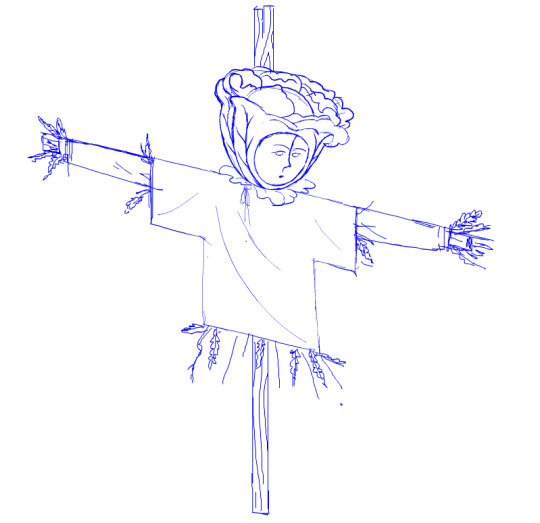
I'll then do a mix of hand drawing and vector shape tool rendering. I use the Paint Brush tool to hand draw strokes, and the line and shape tools mixed with transform to make more geometrically accurate shapes. The design is rendered into divided closed loop shapes, ready to be filled with a solid. The strokes are kept or removed depending on the design.
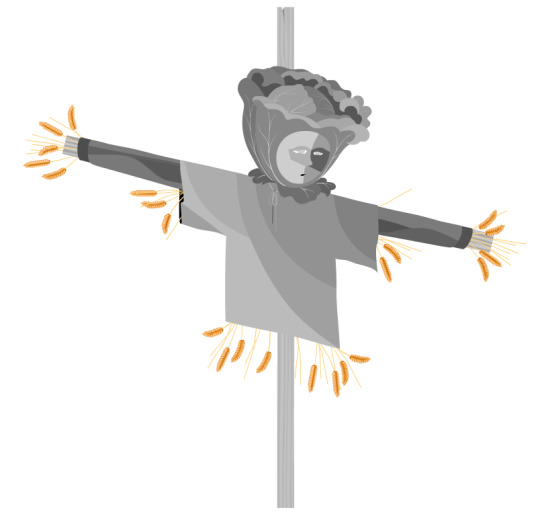
These fill shapes are then either coloured and rendered in Adobe Animate, using fills, gradients, or a more complex process of masks and effects.

Alternatively, I'll bring all these vector shapes into Photoshop and use them as clipping masks. The vector shapes act like masking taped areas or shields to maintain sharp edges, while the brush is like an atomized airbrush used to build soft volumed forms.
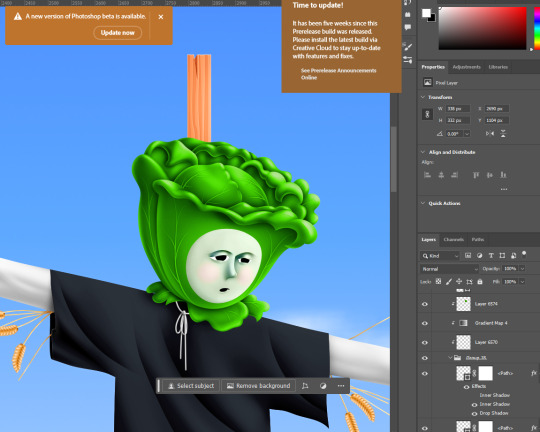
Please excuse all that horrible Adobe Cloud and AI bloatware...
And there we go!
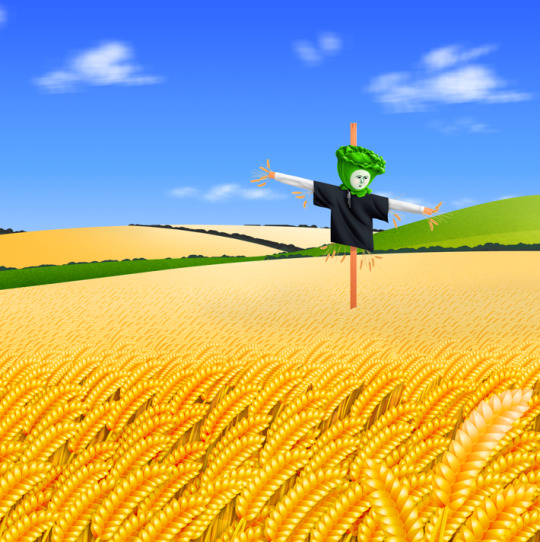
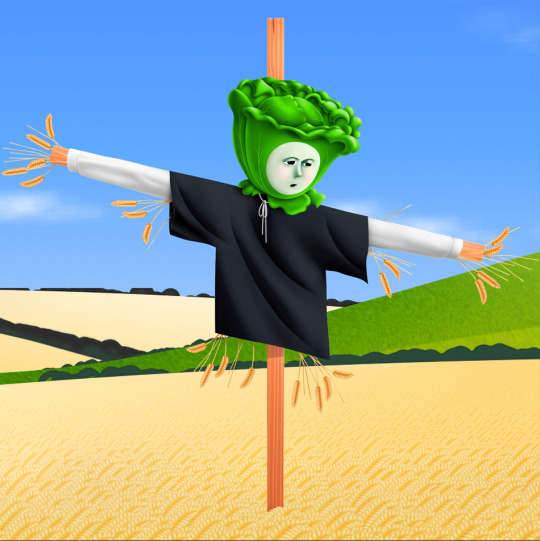
Variations in the process include just using MS Paint, index color in Photoshop, or 3D programs.
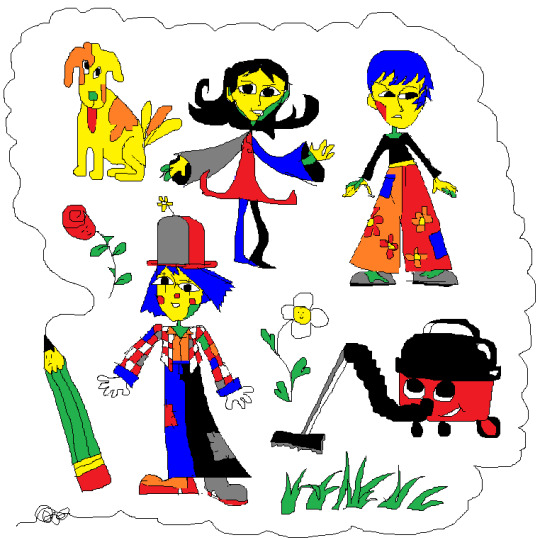
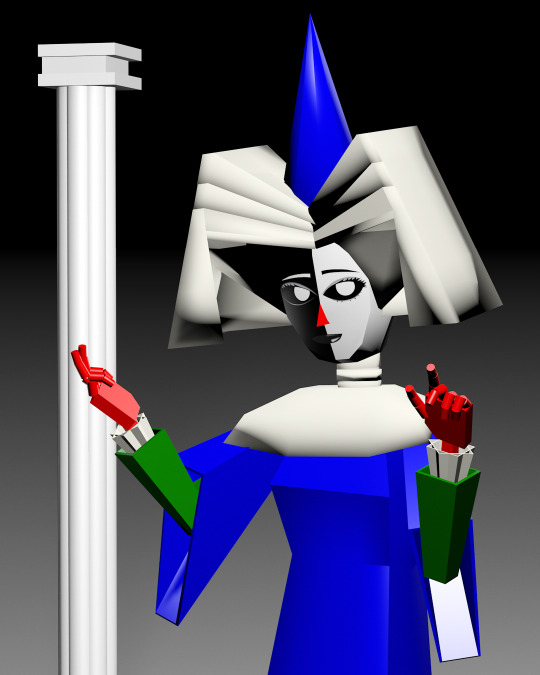
Very old works of mine were almost abstract, just exploring digital mark-making, which was a trend I was following in the mid 2010s that I loved. This kind of stuff.
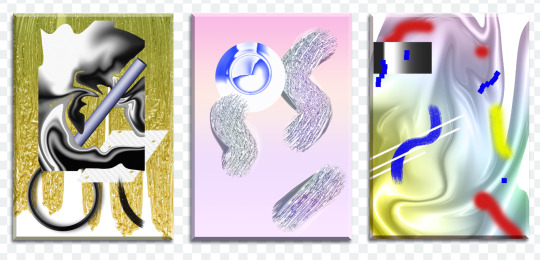
While my current work uses its digital material specificity as an intermediary to the subject in the illustration.

For example, #ersatz.world parodies clip-art and flash edutainment styles but imagines the characters living within that kind of world. The designs are meant to be cute, easy to read, light in computer processing, but also irreverent, janky, and generic too.
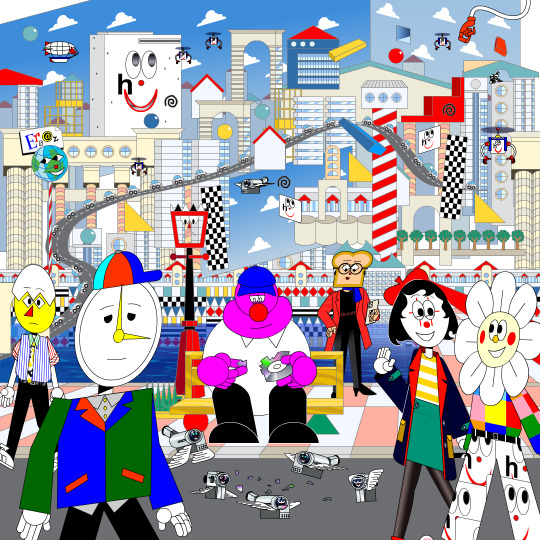
People typically regard this sort of clip art style as ephemeral trash, but I always found them charming. I use Ersatz World primarily as a satire vehicle, parodying educational formats to spoof corporate explainer content and digital media.
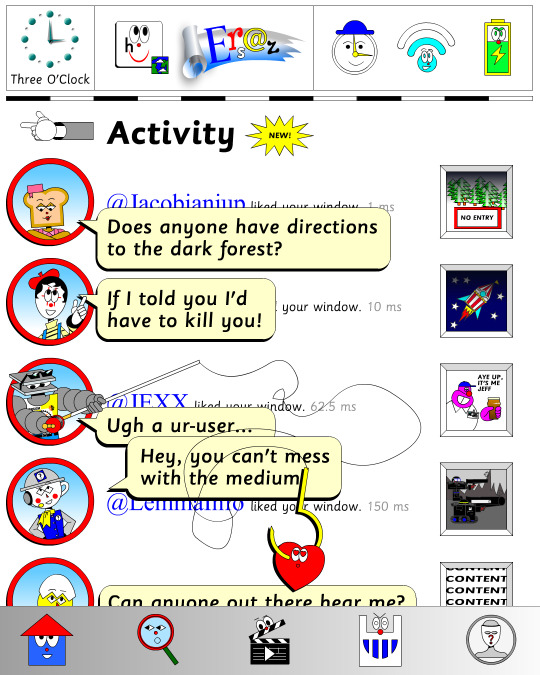
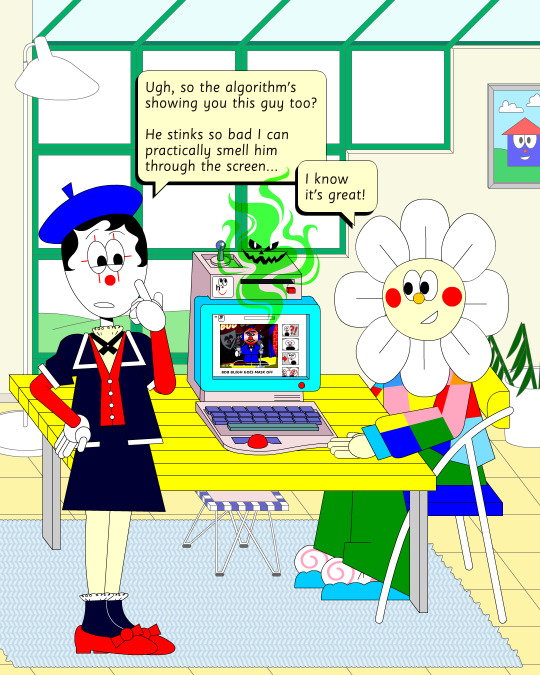
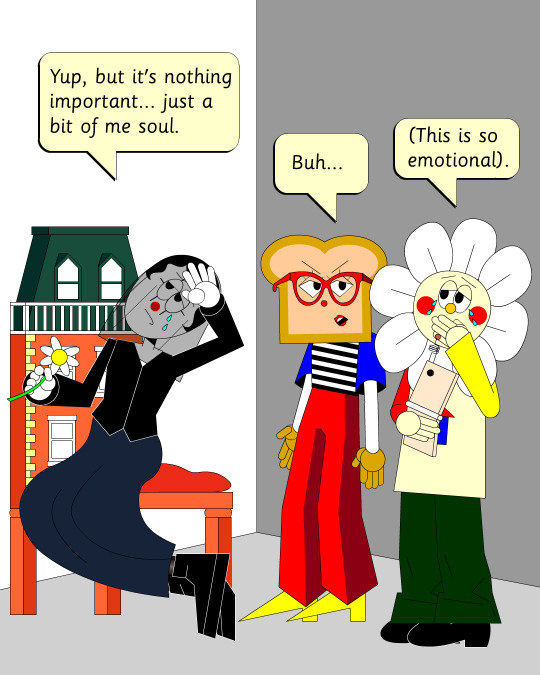
However, part of the problem with Ersatz is I've made it look too polished, complex, and I've grown too attached to the characters, which I imagine is a typical issue with overbuilding a world. So recently, I've made an even jankier Ersatz-like set of characters to play about with, using an even simpler style with less cohesion. I like to try and use slightly different styles and digital material styles to relate to the property at hand.
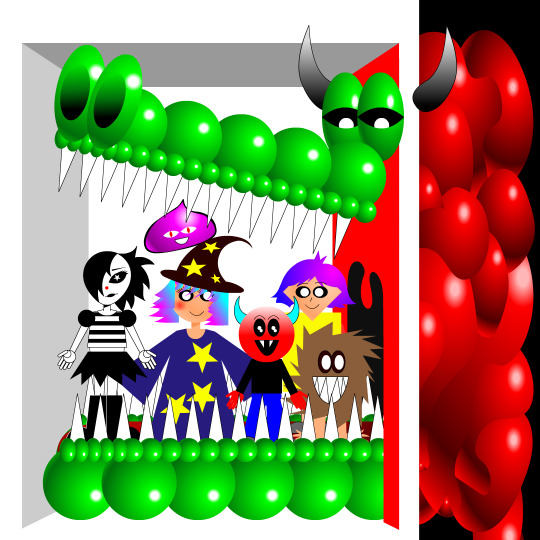
That’s why #autonymus has a bitmap digital material and a denser feel to it. Unlike Ersatz, Autonymus is not meant to be an overt semi-meta fiction. It’s not exactly pixel art, but the pixels are just about visible, as the intention is to create a digital expressionist depth to the setting. Although it’s still stylized and not realistic to our world, I definitely still want to evoke semblances of our world. That’s why there’s attention to landscape, plant life, and implied life beyond what you see in the frame with the characters, etc. But I'm still making a cartoon, and I still want it to feel at ease with itself being a digital material work. Characters are therefore flat, simple, stiff, and the speech style is like a bad Shakespeare parody. I like to balance between ugly and appealing, simple and complex, familiar and unfamiliar.
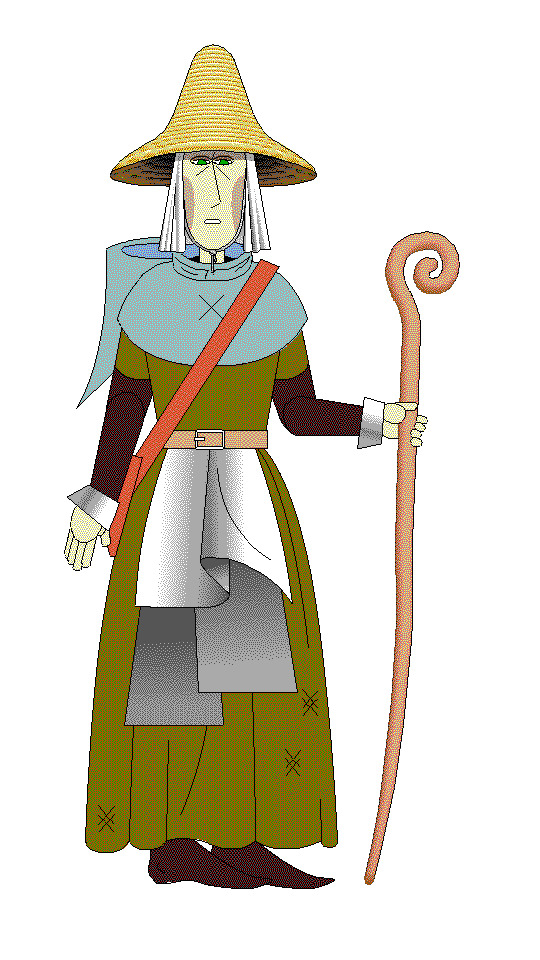
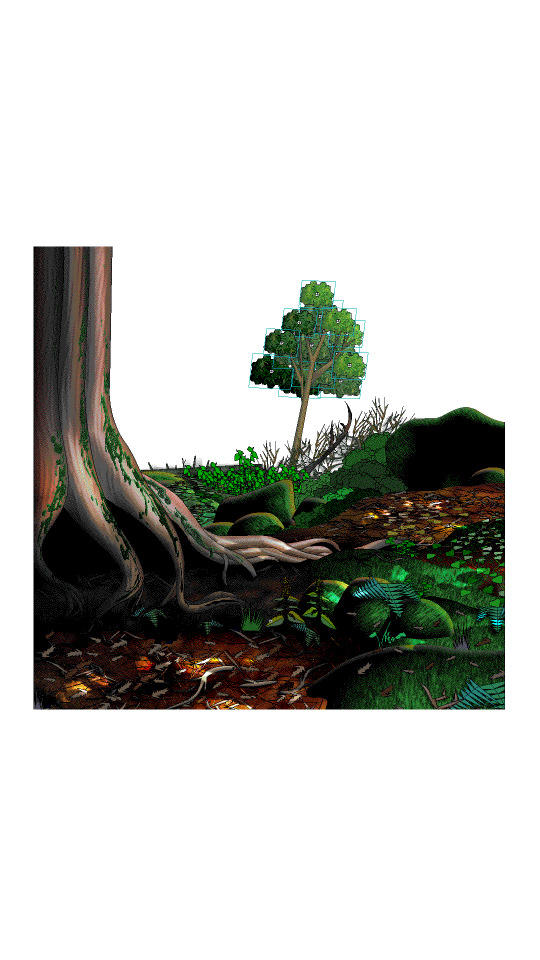
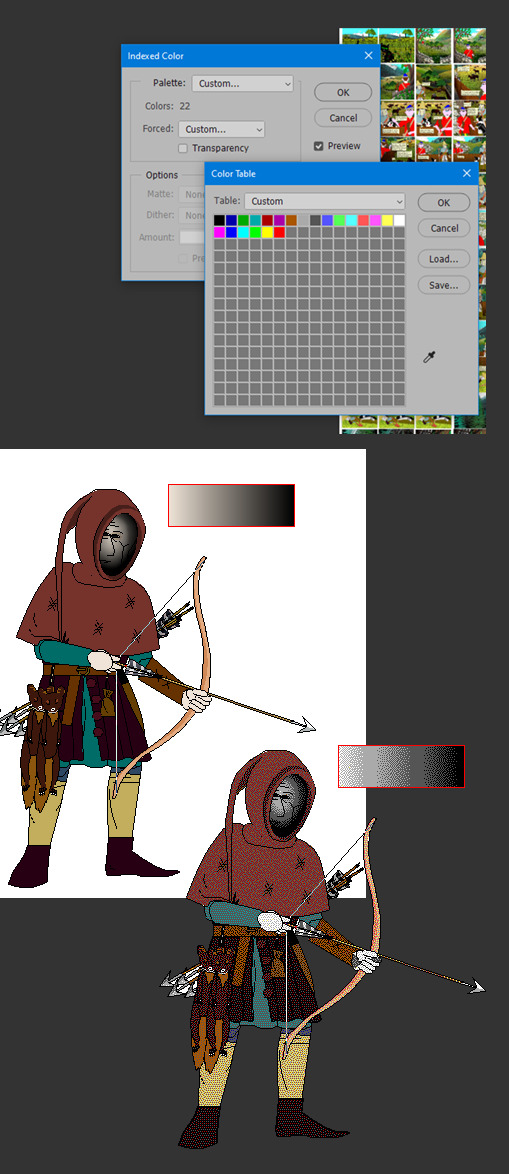
In regard to things like inspiration, references, and my relationship to aesthetic genres; these things certainly factor into my work, perhaps I'm even overtly dependent on them. My work can definitely be post-modernist in method; creating new, ironic, or fragmented interpretations through deconstructing a mix of various styles or methods. But at the same time, I'm still trying to make a digital gestural representation where the aesthetic is driven by my relationship to the software and techniques directly—not simply in an attempt to reference a style. For example, I like drawing lines in sweeping strokes, not to a point of geometric perfection, but just in a way where the curves are smooth and simple. But if I want perfectly curved or straight lines, I'll use the vector tools.
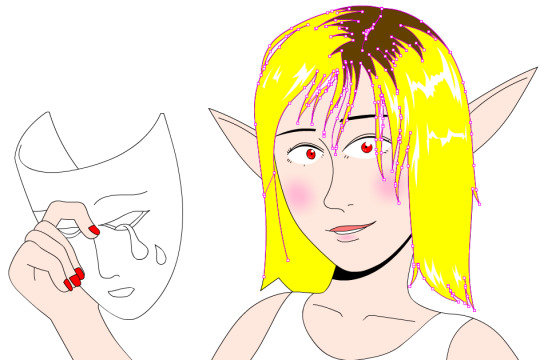
Working this way, you can sort of learn why certain styles and design choices in past vector aesthetics were made, as they would have also needed to make similar choices. That’s why I’m more mindful of using digital material specificity as a foundation to build narrative and subjects upon these days.
For example, genre references like cyberpunk clichés for #cyberhell or late medieval design for #autonymus or 2005 to 2015 era subculture fashion for #gradientgoblinz.
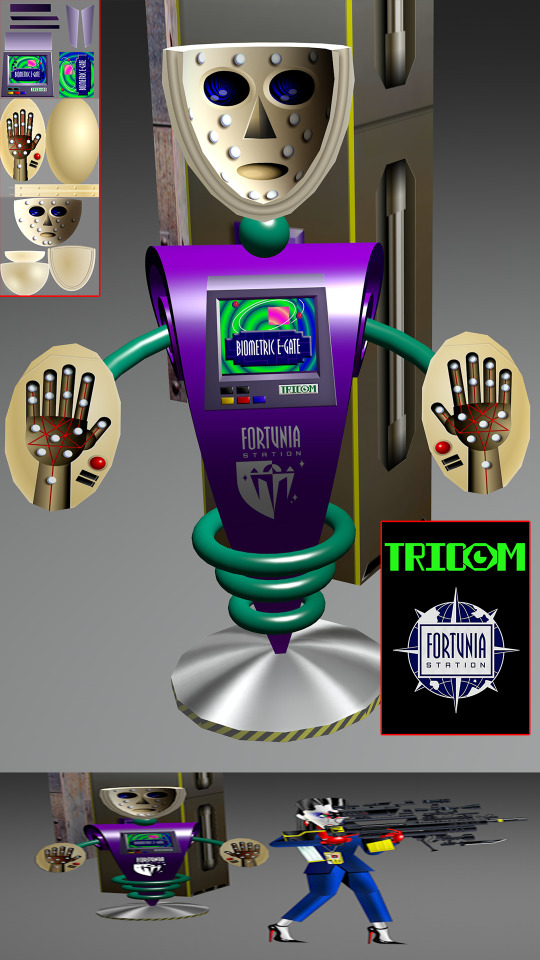
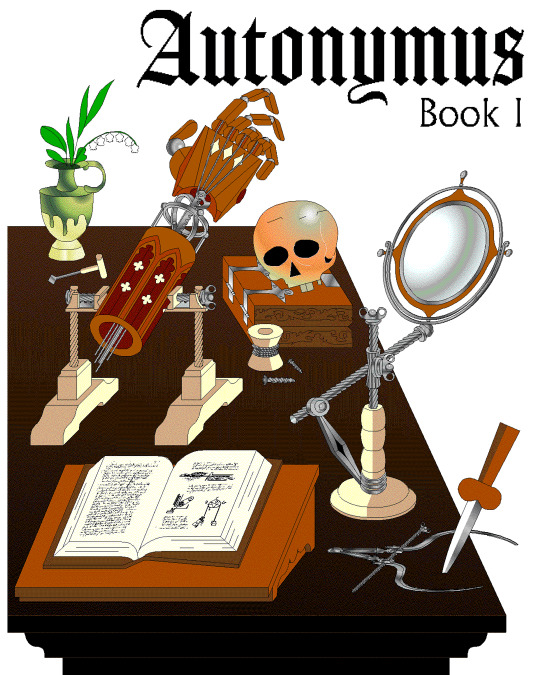
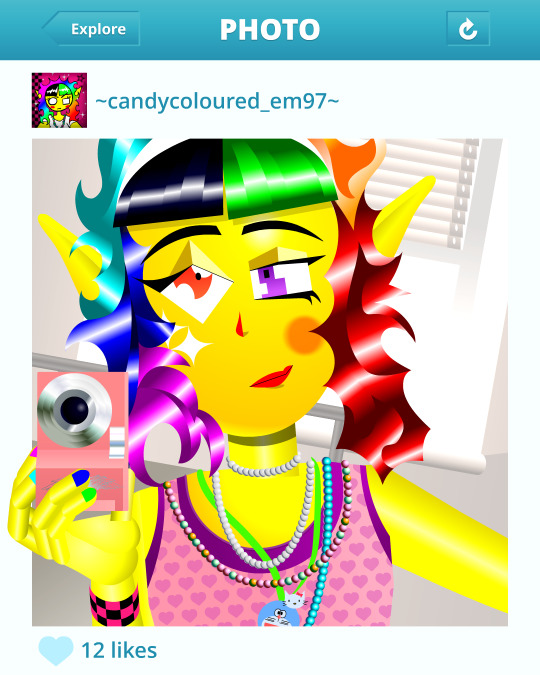
I think it’s important to take inspiration and reference from a wide variety of sources, but I think they’d mean nothing without having something to say or express. Autonymus, although it is a collection of tropes and clichés, isn’t just about that. It’s a story about the tensions of socially constructed systems and how that shapes faith, technology, and the natural world, or at least that's what I'm aiming for anyway.
But despite all that, I think there’s a danger of locking myself into the past by using these methods. For example, using nostalgia and references to past aesthetics can result in just recreating the past in a form of role-play. To avoid that, I try and evoke the past through a messy, inaccurate pastiche rather than caring to accurately re-enact anything. I’m probably not always successful at communicating the deliberateness of this, and it can certainly get very frustrating and pedantic. To be honest, I do kind of hate aesthetic labels (terms like Y2K, global coffee house, utopian scholastic designs from a pre-9/11 world).
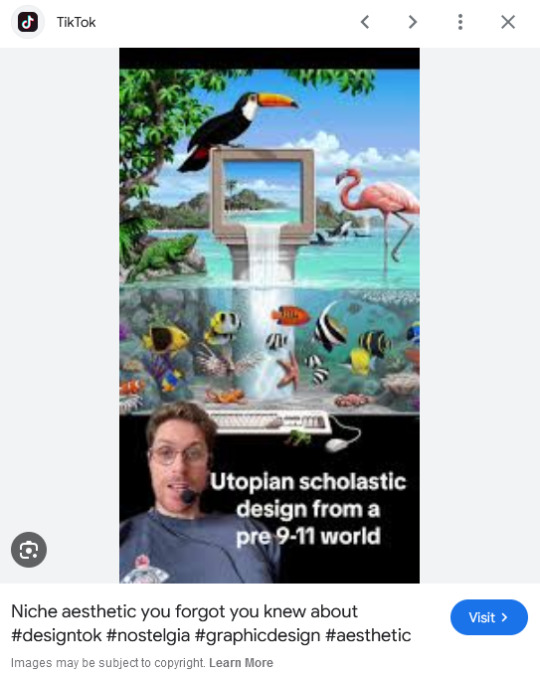
I do not believe that a project aimed solely at mapping history through aesthetic styles is worthwhile. Sure, they can be handy for organizing style trends, but they can also be reductive and ahistoric. Who are these people to define the history of these design eras? The result is a kind of suffocating simulation of design history but removed from context, perfect for moodboardism. I wish it felt more tongue-in-cheek, less absolute of itself in its own practice. Instead, it acts to legitimize and engender those making these labels, almost giving them ownership of the design styles. It’s similar to the logic and process of generative AI and its databases in a way, just done manually.
I’m very inspired by artists like Oneohtrix Point Never in this regard, as I think he’s able to create an aesthetic portal to all kinds of memories, feelings, and worlds reminiscent of the past, while still being in the present. It’s more a reflection of how timelines are messy now, like a memory or dream, rather than an audacity to say the past was actually like that, or to try to actually map some kind of timeline.
I think the benefit of this process is how it avoids the other side of the spectrum—being locked into chasing the cutting edge of digital processes. I don't necessarily think using an old digital process means your work inherits the semiotics of old aesthetics. Non-digital mediums don’t have this issue to this degree, as you can still paint in oils and be considered contemporary, or at least it's not frowned upon to such a degree. And I also don't think anyone in the heyday of Flash ever made work the same as I do, especially as computers are more powerful now so can handle more. I probably shouldn't boast too much about that though, as artists at the time probably just had more sense than to use Flash like a painting program! So then, why is my use of Adobe Animate critiqued as obsolete and an aesthetic dead-end? Because to whose standards is this process obsolete? If you value digital aesthetics as an apparatus in industry practice, then sure, my work is redundant.

But as wonderful as the latest tech can be in creating new aesthetics, I do feel it can be overtly dependent on the trends and directions of tech corporations, and therefore act as an indirect propaganda tool to their hegemony over digital aesthetics, such as the ever-demanding processing power needed for simulated realism. If anything, work that does follow in the direction of the latest tech trends is ironically the quickest to date once the trends move on.
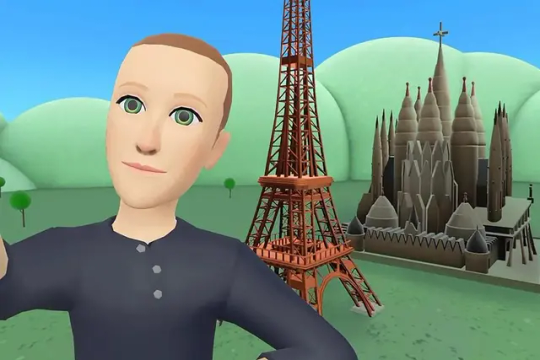
I've noticed I've not really described what my work is about, just the process, in this text. But I don't know, maybe I like Flash because it is regarded as redundant. No one really cares about it, so I feel free to make whatever I want, and can decide on form myself, to my own standards, the quality of my work. As fun as making images is, I find it difficult to put into words what it is exactly I'm expressing in my work, and perhaps that would spoil it anyway.
219 notes
·
View notes
Text
I think what makes Qiang Jin Jiu so great as a historical court politics danmei is that it’s not just about the power struggles in the Imperial Court, it portrays real issues that are still prevalent even in modern times such as corruption, poverty, misogyny, female oppression, etc.
The working class suffers due to increasing wealth inequality and corrupt officials who are too busy deepening their own pockets. People die of starvation and the government simply chooses to close its eyes. Women are still discriminated against in the workplace and their achievements are often questioned and undervalued. Majority of rape cases are not even investigated, the perpetrators get away scot-free while the victims are shamed instead. It’s very easy to compare the fictional story with the real life predicaments in today’s news.
Additionally, even the corrupt clans and the Biansha tribes are not portrayed in a black-or-white manner—they are not just two-dimensional evil characters; there are multiple characters from the eight great clans who are still good at heart and struggled to do the right thing such as Hua Xiangyi and Pan Lin, and through Hasen and Duo’erlan we were shown that the Biansha tribes are also human beings—they have families, and they are struggling to survive in the desert. The war is a brutality that causes casualties in both sides, but there are parties that benefit from it just as other parties suffer deeply from it.
Qiang Jin Jiu is a multifaceted story—it has excellent romance, but it’s not just mainly about the romance. The author went through great lengths to establish such a complex world-building then executes the plot and climax beautifully, in a way that’s consistent with every character’s personality, background, motivations, and relationships. This not only makes the story development compelling and believable, but also allows the author to bring forth complex issues that can become food for thought for the readers who empathized with the characters. This is why Qiang Jin Jiu is such a masterpiece.
#ballad of sword and wine#qiang jin jiu#gushing about qjj#Why T97 is Thee GOAT#an essay by me#meta#qjj#qjj spoilers
79 notes
·
View notes
Text
Mechanical eastern dragon.
Danny, ever since he was a wee little lad, about 5 or so. Really liked eastern dragons since he found out about them, so much so that he even tried to make his own little eastern dragons!
When Jack saw that, it seemed to strike something in him and suddenly Danny found himself having a more experienced hand aiding him in his crafts.
Jack started directing him towards something simpler than a dragon when he was first starting out, then over time gradually let him make certain parts of a dragon instead of all at once, then when they were all complete, they stuck them together and Danny? Well, he found out why his dad liked to build so much.
So, he started to build more and more little things, small yet complex that'll eventually come together to form his eastern dragon.
As he got older, and his parents became more and more focused on their portal project, he eventually decided that, hey, why doesn't he just make a giant version of his little crafts?
An actual dragon.
Of course, such a thing was no easy feat, so he started it just like his dad taught him too, little pieces over time that'll eventually come together to make what will essentially be his masterpiece.
However, he lacks the parts to do so.
Well, not exactly considering there's a lot of household things he could take apart for scrap, but his parents are already doing that, plus he wants way better materials that'll really shape this up to be his mastepiece.
So he took to instead drawing out how it'll look, and creating various minor pieces that'll go into powering it and stuff. He took some of the ectoplasmic batteries his parents' didn't have a use for anymore, and kinda just, fused them together?
Either way, he made a core that'll be the basis of power for his dragon when he completes! Of course, it'll have to go over multiple modifications over the years while he refines the design for his dragon, to make it able to hold more energy, more durable and far more powerful.
He won't lie, he was both extremely suspicious and immensely grateful when Sam gave him a diamond of all things to make a battery out of, because she obviously wanted something outta it. What did she want? Dibs on being one of the first too see his creation when its finished.
Very simple, plus she said her parents could buy another one anyways. Ah, the joys of being rich.
Then he heard from his parents about how their portal works, though he wasn't too interested since he was too busy building the skeleton of his dragon from the parts Sam gave him.
Tucker, who was dabbling in coding, decided that he was going to attempt to create a high level AI for Danny's project, which Danny was all for! Great materials provided by his friend, and then his other one wanted to make an AI specifically for his masterpiece?
Why would he ever say no?
Jazz has been acting pretty weird thought lately, he noticed a bit after the day he was made aware of how his parents' portal managed to work, how he still isn't sure, nor did he actually believe there was a realm of the dead but eh. He would admit, he wasn't terribly close with his sister, ever since he started up his master work, and became a fink, but he could tell something was different.
Really only because she seemed to be finally getting off his case about how much work he's putting into his dragon and less into taking care of himself properly, which she usually does by bossing him around. But he thinks she's just busy, and is too busy to even care at this point so it didn't really matter.
He was a bit blindsided by ghosts actually being real but easily accepted it to be honest. Like, he's been using stuff powered by ectoplasm that ghosts are supposedly made of, so it wasn't that much of a stretch.
Of course, a ghost fighting against another ghost was new, different from what his parents had told him, but it was nice to have someone protecting the town other than his parents at the very least.
As he got closer and closer to finishing his masterpiece, and as Tucker himself almost finishing with the AI, his grades weren't receiving that much attention, he would admit. He would look back at them when he completed it, alright? But not now.
Then came a day where he was saved from a ghost attack by Amity Park's hero, and while he was extremely tired, he recognized that bossiness, snobbish attitude and smothering from anywhere. Did he expect his sister to be the ghostly town hero? No, no he did not.
Was he going to tell anyone? Not really, he cared, but he didn't care that much about to go around talking about it. Also, wasn't his place to spill his sister's secret really.
Also, she didn't know he knew, and he planned to keep it that way for the foreseeable future.
Just as he was nearing his completion, only having just a few finishing touches before it was ready for the AI to be uploaded to it, a test popped that he apparently had to study for, with his sister already passing with flying colors (which just proves how much smarter she is than him, because she fights ghosts regularly, he doesn't, doing something much safer and what does he have to show for it?) and urging him to study. Which, with her attitude that got even worse, after becoming half-ghost and a hero, he just, couldn't take.
He's thankful that ghost came when they did, because he just couldn't stand her any longer than that. So he just popped over to Nasty Burger instead, removing himself far as he could from that fight, and of course, of course said fight had to end up there.
The universe just hates him, it seemed. On the plus side, he managed to snag the answer sheet to that C.A.T. test his sister was nagging him about, why would he study if he has this now? Besides, he has something more important to do anyways.
Then a while he's confronted by his sister's apparent alternate evil future self after he dropped his knowledge of her secret in attempts to stave off the conversation of him cheating, which, now that he thought of it, was probably better than finding out and subsequently being knocked out by his sister's alternate self.
Thankfully, when he next awoke, he found his project was perfectly untouched, and then had to leave to take the test. He'll figure out a way to deal with his sister's future self later. While later, he finished the test, and was finally glad to be able to add the last touches to his project.
Oh, right, his sister's evil self. He almost forgot about her if he was being honest. So, he took the Fenton Peeler, and was going to go find his sister before he had to be called to Nasty Burger by his parents and, well, his 'sister' was there, and his cheating was already revealed and decided it's literally whatever and shot her.
Weird that he was separated from everyone else, but it's whatever. Sure, the sauce was going to explode and kill everyone, but he believed in his sister to come and save the day, as she always did and will continue doing and he told his sister's evil self that, and was incredibly smug when it happened.
He watched the fight, cheering a bit from the sidelines because, well, c'mon. It's not everyday he watches his sister beat her future self the up, and he might not get this chance ever again so might as well enjoy it while he can.
Unfortunately, he never accounted for his sister being too weak after said fight to help their parents', Mr. Lancer, and his friends, and then he saw them explode.
Then his sister disappeared.
He, very obviously, did not take this well at all. So, after he got back home, feeling both like shit and nothing at all, he stared at the almost finished eastern dragon sitting to the side of his bedroom/workshop, the only component missing being the AI bead, and promptly broke down crying.
He didn't cry earlier, but he just, couldn't contain himself. His parents were dead, his teacher was dead, and his two only best friends were dead too, and his sister disappeared in front of him and he had no idea where she could be.
He then cried himself to sleep.
Then he woke up, took up the AI bead, and inserted it into the dragon sluggishly.
It's completion was a solemn affair, rather than the bright and happy thing he expected and wanted. No one was around to marvel at his genius, too see the end result of what he tried for years to achieve, and no sister that he could rub it in her face about either.
He had nothing. Nothing but the product created from the combined efforts from him and his friends.
So, what was he to do?
Modify it, of course!
He threw all his attention into it, installing weapons, fiddling around with the core (That he had to take out and put back in) and giving it a lot of ghost shields, and other Fenton tech.
And for what? He doesn't know, but this, giant thing, somehow capable of growing and shrinking to his choosing (he still doesn't know how, even though he made the thing), installed to the brim with Fenton tech, is his.
And he'll use it to find his goddamn sister. Sure, they didn't have the greatest relationship, and sure, she wasn't the best to get along with, but she was the only thing he had left, and whoever took her could pry her from his and his dragon's goddamn hands.
Also, who would he rub his genius in the face of, if he didn't find her?
So, he took off to the zone, got lost, fought a few ghosts with his dragon and Fenton tech, and then ended up in another dimension full of heroes and villains. Did he care about that?
Fuck no.
But apparently, being a 14-year-old and fighting people off with his mechanical dragon was not a normal thing. Sure, he may have overreacted by having said dragon through his aggressors, who were normal humans by the way, through multiple walls, but in his defense.
It was their fault for trying him when he wasn't in the best of moods.
#dc x dp#dp x dc#dp x dc crossover#dpxdc#dcxdp#dc x dp crossover#FINALLY DONE#Anyways#Jazz is completely unaware that the timeline where her parents Mr. Lancer and her brother's friends died still existed#So she's just living it up in the timeline Clockwork sent her too and avoided the explosion lol
350 notes
·
View notes
Text
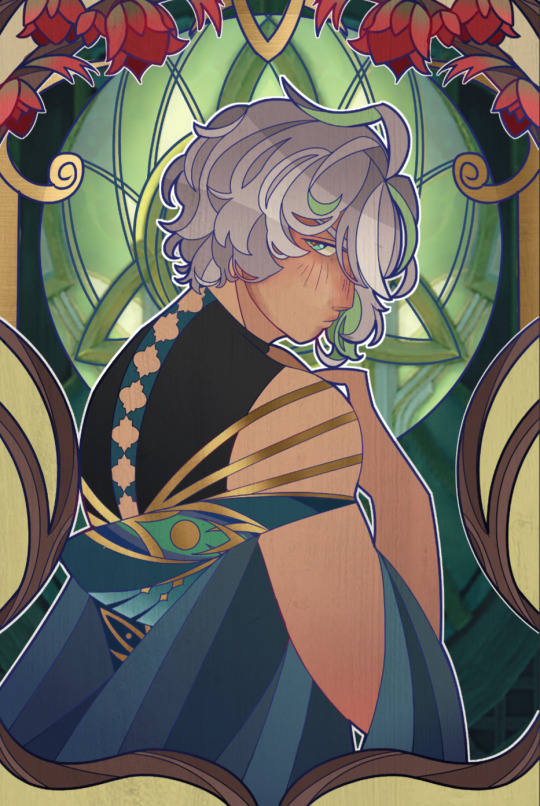
Alhaitham in an Art Nouveau inspired style Here's a thread I wrote about this concept on Twitter, below the cut will be a copy of the text, sorry if it takes a weird format on tumblr since it was initially written as a twt thread
This might not make a lot of sense to some of you but before i talk about Alhaitham and Art Nouveau i'd like to talk about Kaveh and Romanticism The connection between Kaveh and Romanticism can be more easily done, specially with characters such as Faruzan calling him a romantic

The Romantic movement, as the name suggest, is very emotionally driven. Its a movement that values individualism ane subjectvism, it's objective is on evoking an emotional response, most comonly being feelings of sympathy, awe, fear, dread and wonder in relation to the world
Basically the artistic view of the Romantic is to represent the world while trying to say "we are hopeless in the grand scheme of things, little can we do to change the world yet the world is always changing us"
In Romantic pieces the man is always small compared to the setting they find themselves in, see the painting Wanderer Above the Sea of Fog by Caspar David Friedrich as an example, the human figure is central but relativelly insignificant to the world

Another thing about Romanticism is the importance of beauty, it's through it that the Romantic seeks to get in touch with their emotions and ituition and its through these lenses that they see the world. The Kaveh comparison should be easy to make with these descriptions
Kaveh's idle chat "The ability to ability to appreciat beauty is an important virtue" just cements to me the idea that his romanticism is closely connected to the artistic movement. He does have an argument agaisnt this connection but I'll bring it up later on the thread
Now that I used the opportunity to talk about my favorite character in a thread that wasn't supposed to be about him let's go back to Alhaitham and how to connect him to the Art Nouveau movement
But seriously, I brought up Kaveh's more obvious connection to Romanticism because the Nouveau movement was created as a direct mirrored response to the Romantic movement, and we all know how we feel about mirrored themes between these two characters
Art Nouveau is about rationality and logic, the movement was used more comonly on mass produced interior design pieces or architectural buildings, it's a movement much more focused on functionality than on art appreciation
They also had a big focus on the natural world but in a very different way, while Romantics saw nature as a power they couldnt contend with, artists from the Nouveau used the natural as an universal symbolical theme for broad mass appeal
Flowers, leaves, branches, complexes and organic shapes are the basis of this style, the logical side of it coming from the mathematics needed to create these shapes and themes in ways that were appealing and also structurally sound
To appreciate the Art Nouveau style is to understand it is a calculated artistic movement (another reason to be salty about an AI generated image trying to emulate it) In short, this style is less about the art and more about the rationality in the mathematics to make it
Another note I'd like to point out is that I love how both Alhaitham and Kaveh have dendro visions while both movements are so nature centric in different ways, Romanticism seeing it as a subjective power and Art Nouveau seeing it as recognizeable symbols
I mentioned an argument against the Kaveh comparison before: the one thing that bothers me about Romanticism is how negative it is in relation to humanity's position in the world and how that related back to Kaveh
In the Parade of Providence it was explicitely showed how much Kaveh dislikes the idea of people seeing themselves as helpless in relation to the problems of the world
People may suffer but there is something he can do to help them and he will do it
It doesn't feel right for me to say that Kaveh fits the Romantic themes because of his suffering, in a similar sense it also doesn't feel right to me to say Alhaitham fits Art Nouveau because of his rational behaviour while he as a character is a lot more complex than that
This thread was done all in fun and love for an artistic discussion, it's not a perfect argument to connect these characters and movements
+ I haven't studied art history in a year, if anyone knows more about these movements please tell me I love learning new things
++ Really sorry if my english is bad or I sound repetitive, it's not my first language and im trying my best here
Thanks for reading
I love you, have a nice day/evening/night
#my art#genshin impact#alhaitham#al haitham#i'll also tag#kaveh#because of the text#anyways uhm#in short i saw an ai generated image claiming to be alhaitham in an art nouveau style#because of that i felt the urge to not only redraw it so there was a human made piece resembling it#but also to erm actually it in general#it activated my art history autism so i had to
111 notes
·
View notes
Note
You like rpgs. Do you recommend any games like baldurs gate 3?
Absolutely. I'll assume you mean CRPGs and not RPGs in general.
Computer Roleplaying Games (CRPGs) refers to a style and genre of game that BG3 follows. Some have started calling CRPGs "Classic RPGs" instead. CRPGs are typically identified by an isometric, top down view style, a heavy focus on story and exploration.
I'm going to split my list it three main categories based on accessibility factors. These factors include the amount of reading involved, the depth of mechanics and the level of abstraction/math required.
Easy Entry Level
Baldur's Gate 3 - 2023 - Larian Studios. The current gold star for easy entry CRPGs. Exceptional graphics, every character voice acted, very little reading and fairly straightforward mechanics and concepts.
Divinity: Original Sin 2 DE- 2017 - Larian Studios. This is basically a less polished, more complex version of BG3 and made by the same studio.
Disco Elysium, Final Cut - 2019 - ZA/UM. Disco Elysium is a detective/social focus game that dives into heavy narrative concepts. Failing rolls is just as viable for the story as succeeding them, making the game's mechanics take a backseat to story. However, there is a lot of reading and that may be a barrier to entry.
Tyranny - 2016 - Obsidian Entertainment. A game about being evil, it's mechanically pretty simple, but there's a fair bit of jank due to it's low budget, and the game ends on a cliffhanger, but it's story is very solid.
Mid Entry Level
Wasteland 3 - 2020 - inExile Entertainment. The long awaited third installment of the Wasteland franchise and significantly less complex than its predecessors. Post apocalyptic, frozen Colorado, grim reality and goofy ideas. This is the franchise that originally inspired Fallout.
Shadowrun: Dragonfall DC/ Shadowrun: Hong Kong EE - 2014/2015 - Harebrained Schemes. Set in the Fantasy/Cyberpunk hybrid setting of Shadowrun. Fair bit of reading, but the game's mechanics are relatively easy to grasp and don't require a lot of math. Always play Dragonfall before Hong Kong.
Pillars of Eternity 2: Deadfire - 2018 - Obsidian Entertainment. A unique setting, exploring a fictional parallel to the age of piracy. Very wordy (but a lot is voice acted), with a lot of world building, but well worth engaging with. The first game, Pillars of Eternity, is less accessible, but still good.
Kingmaker/Wrath of the Righteous/Rogue Trader - 2020/2022/2023 - Owlcat Games. Owlcat adapts existing systems into CRPGs, like how BG3 is an adaption of DnD 5e. Do not be fooled, these games are where you start hitting a lot of complexity, a lot of math and a lot potential to damage your playthroughs by accident. This is where things start to get difficult.
Difficult Entry Level
Baldur's Gate 1/2 - Bioware - 1998/2000. The prequels to BG3, these games use an older, much more complex version of DnD's rules. Be prepared for a lot of reading and complex mechanics, but you'll be rewarded with some amazing storytelling.
Planescape Torment - Interplay - 1999. Another game using DnD's older mechanics, Planescape is a completely different beast from BG3. Many consider this series mechanically inferior to the Baldur's Gate franchise, but with better storytelling and world building to compensate.
Fallout 1/2 - 1997/1998 - Interplay/Black Isle. One of the most widely known game franchises started as an isometric CRPG. Universally considered more complex, rewarding and deeper than the Bethesda portion of the franchise, you'll need some experience to get into them, but you'll be happy you did.
Games I haven't played but I've heard good things of:
Wasteland 2, DC - 2015 - inExile
Torment: Tides Of Numenera - 2017 - inExile
Neverwinter Nights - 2002 - Bioware
Arcanum - 2001 - Troika Games
Ultima 7 Part 1/Part 2 - 1992/1993 - Origin Systems
Icewind Dale - 2000 - Black Isle Studio
#Baldur's Gate 3#Disco Elysium#DnD#Fallout#Rogue Trader#Warhammer 40k#Pathfinder#Baldur's Gate#Planescape#Bioware#pillars of eternity
277 notes
·
View notes
Text
For Thresholder there are lots and lots of worlds, most of them just name-checked, sketched out in a handful of paragraphs as a place that people had visited before and now has little plot relevance. It's my favorite part of the series.
I'm not writing one of those chapters where I need one of those worlds, and I'm not sure I could give this one its due, but the idea I had last night was a world where people could increase and decrease the size of objects virtually at will. This doesn't work with conventional physics, but that's okay, some of the worlds can be more conceptual.
To start with, we have some ground rules: you have to be touching the thing, it can only operate on loosely defined "whole objects", and there's some kind of thing that happens with objects where they retain their physical structure to some degree, even if the square-cube law means that not everything stays functional. This is easy for things made of base elements (an iron nail becomes bigger and we can grok that it's still just made of regular iron) but it's less easy for complex organics. If you increase the size of an apple, are the individual cells increasing in size? Are new cells being generated? I think for this, I would have to say that the answer is that the world works on a level of pre-Enlightenment human understanding that the real world doesn't have, one where there aren't cells. (I am a bit sketchy on when cells were discovered, and more sketchy on what they thought was going on before that.)
As far as consequences, which is my favorite thing, I think there are a few big ones.
For one, any amount of food is enough to feed an infinite number of people. A single apple can feed a family, if they want to have nothing but apple for a meal. A single apple slice can feed a family. In fact, even the smallest crumb can undergo the process of magnification to become a full meal. But while you can make "more food" by making it bigger, the taste and texture don't necessarily stay the same. It seems to me that there's probably a sweet spot for most foods in terms of size, and eating a grain of rice the size of a loaf of bread is a very different experience than eating a bowl of rice. And if you've ever eaten one of those sourdough breads with way too large of bubbles, that's what pretty much all bread would look like if magnified, just holes with strands of gluten between them. So I think in terms of food, there would be a lot of class divide, along with a lot of processing of magnified foods to make them more palatable. Maybe a loaf-size grain of rice wouldn't appeal to many people, but you can break off bits of it and probably still make mochi with it.
Another big issue is manufacturing and the trades. In my mind, you have construction workers building the equivalent of dollhouses that then get sized up on a plot of land, but I think dollhouses are a little bit small, and most trades would work on a scale that was easiest for human manipulation. I don't think that's what we do for dolls, which tends to be nimble, finnicky work, and if you can freely scale up and scale down your tools and materials, I think you'd naturally want to work a bit bigger. Probably you would rescale on many different steps of whatever you're producing, and if this world was in the industrial age, then you would have people in factories rescaling as a human step in a factory somewhere. Another cool thing is that a chef could have a single pot and pan that they resize for their needs, and a single knife that fulfills roles we would use two or three different knifes for, though I think maybe handles would be a problem there.
Anyway, I'm not going to use this anywhere, though I do think it's cool, if maybe in a way that's not all that unique (What if Big Thing were Little Thing and What if Little Thing were Big Thing are both speculative fiction staples, see Indian in the Cupboard, The Borrowers, Ant-man, etc.). I have a bunch of outstanding questions re: conservation of momentum and some hacks that only work under certain implementations, but sometimes that's a bridge too far.
72 notes
·
View notes
Text
A TALES OF... l Veiled Deception
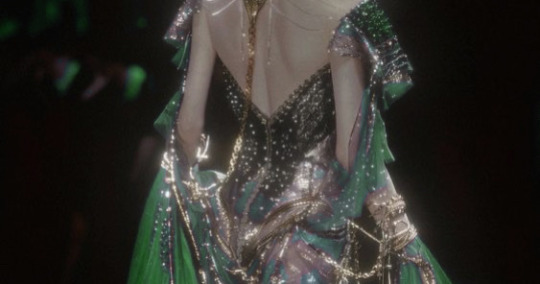
OR.. You get caught up in a flirty exchange with someone you believe to be a mysterious stranger. Unbeknownst to you, it’s someone having a little fun at your expense.
pairings : (Lady) Loki Laufeyson x f!reader
warnings : Mature themes (16+), flirtation and teasing, fake identity, light humor and embarrassment, implied suggestive content, playful banter (Loki being a little shit), implied sexuality. Proceed with caution if you're sensitive to such material.
word count : 3.7k
author's notes : Two in a row, I know, I know but I couldn't resist writing about Lady Loki :[ (this is me avoiding having to review my notes for one of my final exams I'm having tomorrow). Also, can you tell I got inspired by Zelda: BOTW for this one?
(ao3 version)

Your golden trio had been traveling through the realm of Muspelheim for what felt like an eternity. Their latest stop brought you to the desert kingdom of Asethka, a realm renowned for its ancient red-hued civilization. Towering ceramic buildings and gold-laden temples stretched out across the sands, their grandeur undeniable, even in the fading light. This place thrummed with power—a hub of cosmic energy where celestial magic coursed through the very land like the heartbeat of the universe itself.
The constant glowing of your necklace confirmed the King of Dwarves’ intel had been accurate. You were on the right track to recover the next chipped piece of Yggdrasil. But as you quickly learned, navigating Asethka’s complex, matriarchal society would be no easy feat—especially with Thor and Loki as your companions. Here, men were viewed as little more than pets or servants, treated with casual disdain by the women who ruled. It was a society steeped in strict customs, enforced by powerful priestesses, where masculinity was a weakness to be exploited.
You hadn’t anticipated Loki’s solution to this challenge—mostly because he hadn’t bothered to inform you of it beforehand.
The village where you had stopped for the night was little more than a refuge in the endless desert. It was an odd place, small and self-contained, where the air was heavy with the scent of spices and sweat. The people here wore flowing garments that shimmered under the torchlight. The women’s attire reminded you of elaborate Arabian dance costumes, their bodies adorned with coins and glittering jewels. The men, however, were not nearly as free. Many were chained, performing laborious tasks or serving as docile attendants to the women who commanded them.
It was an unsettling dynamic, but not entirely unfamiliar. You had seen societies like this before, where power was hoarded and wielded with ruthless precision.
The bustling fly market had been chaotic, packed with traders and travelers alike. The air was thick with the aromas of exotic spices, and the hum of whispered deals surrounded you. Loki, true to form, had disappeared into the crowd without so much as a word. You weren’t sure what he was up to—possibly hunting for something, possibly scheming. With him, it could be either or both.
While Loki was off doing whatever it was Loki did, you and Thor had spent your time gathering what little intel you could before returning to the modest inn where you were staying. Exhaustion weighed heavily on you. The unrelenting desert heat had drained you, and the constant tension of your journey was beginning to take its toll. When night finally fell, you decided to take a break from the stress and the oppressive masculinity of your traveling companions.
The tavern downstairs was dimly lit, filled with the low hum of music and the comforting aroma of roasted meats and spices. You settled in at the bar, ordering a drink that looked vaguely fruity but didn’t bother asking about its ingredients—better safe than sorry, especially after your last unfortunate experience with local cuisine.
As you sipped your drink, you turned to observe the room, letting your guard down just a little. It was a rare moment of reprieve, one you intended to savor.
That was when you saw her.
A woman standing out amongst the mass, dressed in shimmering gold and green, intricate patterns painted onto her skin. Her long, midnight-colored hair framed a stunning face and fell like a waterfall around her slender body, shimmering under the moody light like her eyes that glinted with both assurance and intrepidity. Her movements were graceful, almost hypnotic; she moved as though the hot desert wind from the outside itself guided her steps.
You froze, the drink halfway to your lips, unable to tear your eyes away. She was stunning—commanding, even. Her presence was magnetic, her beauty almost unreal. And yet, there was something else about her, something that made your pulse quicken.
She was beautiful, commanding, and… looked eerily familiar. She wore a stunning local desert outfit of deep emerald, adorned with intricate gold jewelry all around her body that shimmered under the flickering torchlight.
You raised an eyebrow as you watched her approach the bar near where you were stationed, your eyes narrowing in confusion. Loki? It couldn’t be. You had to be delirious—surely the constant teasing and lurking of the Asgardian hadn’t messed with your head so much that you’d immediately think of him at this moment.
You tried to shake the odd feeling in your chest as your gaze lingered on the stunning woman. You were just imagining things; there was no way it could be Loki. And yet, the woman’s features—those sharp, calculating eyes and the mischievous glint in her smile—felt undeniably familiar, even though they seemed so out of place in this realm. It had to be a coincidence, you told yourself, but the more you watched her, the more something about her presence seemed to pull you in.
She must have sensed your attention because the woman turned her head slowly, her lips curling into a knowing smile. Her sharp eyes locked onto yours from across the room, sending a jolt through you. There was no mistaking it now—she was watching you, and not just idly. No, her gaze felt deliberate, purposeful. She was engaging.
Your breath caught as your gazes met, the inexplicable pull between you growing stronger. Your heart rate quickened, and you took a sip of your drink without thinking, trying to steady yourself. Your thoughts raced, but no matter how hard you tried, you couldn’t shake the feeling that there was more to this encounter than what it appeared to be on the surface.
The woman tilted her head slightly, her expression unreadable but somehow inviting. Then, with a grace that seemed almost unreal, she began to saunter toward you. Each step was measured, exuding confidence, her emerald dress shimmering in the dim light while the golden accents adorning her caught the flicker of nearby torches. The air around you felt heavier as she approached, and the bustling noise of the bar seemed to fade into the background. All you could hear was the rhythmic click of her heels and the pounding of your own heart.
When she finally reached the counter, she didn’t speak right away. Instead, she leaned casually against the bar, her gaze fixed on you, unrelenting. You suddenly found it difficult to meet those piercing eyes, and an unfamiliar warmth began to spread through your face.
“Are you always this transfixed by strangers, or is it just me?” The woman’s voice carried a soft, seductive sweetness that sent shivers down your spine.
You quickly wiped your hands on your pants, pretending not to notice the heat spreading across your cheeks. “I… I wasn’t staring,” you muttered, embarrassment lacing your tone, though you knew it was a futile attempt to deny the obvious. Your voice came out flustered, and you winced internally. Normally, you’d be the one doing the teasing, not stumbling over your words like this.
The woman smirked, clearly enjoying the effect she had on you. “Oh, but you were,” she purred, sliding gracefully into the seat beside you. “Do not worry—I take pleasure in being admired.”
Your mind scrambled for a response, something witty to reclaim control of the conversation. “I wasn’t admiring you,” you shot back quickly, your tone sharper than you intended. “I was just… curious.”
Her eyebrow arched, and a knowing grin spread across her lips. “Curious?” she repeated, her voice playful as she let the word linger. “Curious about what exactly? The woman who can command a room with just her presence?” She gestured faintly toward the rest of the tavern, but the glint in her eyes made your stomach twist in a way that was hard to ignore.
You shifted uncomfortably under her gaze, the tension between you growing thicker. “I—well, uh—” you stammered, struggling to steady your thoughts. “Maybe… maybe I was curious about why you seem so different from everyone else around here.” You’d tried to keep your tone light, but your words carried more weight than you intended.
Despite your attempt to maintain composure, your attention was momentarily drawn to something small and ornate attached to her waist. It was a charm, shimmering with a cold light that seemed out of place against the desert’s relentless heat—yet somehow familiar. Your eyes lingered on it briefly, a faint flicker of recognition sparking in your mind. You had seen that trinket before, earlier in this journey.
Her gaze darkened almost imperceptibly, and her lips pressed into a serious line for a fleeting moment. If she noticed your glance at the charm, she gave no sign of it. The somber expression faded as quickly as it had appeared, replaced by a teasing smile. “Ah, I see. A keen observer,” she remarked, her tone light and lilting. “You’d be right to notice. I don’t exactly fit in with the rest of these people.”
You opened your mouth to ask what she meant, but before you could speak, her fingers brushed lightly against your arm, sending a jolt of electricity through you. Your breath caught at the sudden contact, and your heart stuttered in your chest.
“But I do enjoy the attention you’re giving me,” she murmured, her voice low and intimate, as though she were confiding a secret meant only for you.
Your pulse quickened, heat blooming in your chest as you struggled to steady yourself. “I—” The words caught in your throat, and you cursed yourself internally. This wasn’t like you. You were usually the one in control, the one who stayed collected. But something about this woman—her enigmatic presence, the way she spoke, the way she moved—it left you feeling unmoored.
Before you could regain your footing, she leaned in closer, her lips brushing lightly against your ear as she whispered, “Tell me, does your curiosity extend to more… personal matters?”
Your teeth grazed your bottom lip as you fought to maintain your composure, but the undeniable chemistry between you made it nearly impossible. “I don’t know,” you began, your voice low and measured, “maybe I was curious if someone like you could hold my attention for longer than a few minutes.”
Her eyes sparkled with amusement, a satisfied smile curving her lips. “Well then,” she responded in the same hushed tone, “perhaps you should test me, and see if I can keep you intrigued for the rest of the night.”
A rush of heat flooded your body, your chest tightening with anticipation as you tried to steady yourself. You weren’t used to feeling so out of control, but there was something about her—something magnetic, intoxicating—that was impossible to resist. Tilting your head slightly, you met her gaze, your lips curving into a bold, mischievous smile. “I have a feeling you could keep me intrigued and entertained,” you replied, your voice gaining confidence.
Her lips parted, her expression shifting to one of impressed delight. “Oh? I must admit, I’m intrigued by your confidence,” she said, her eyes narrowing slightly in a way that felt both playful and predatory. “Not many women can keep up with me.”
You raised an eyebrow, refusing to back down. “Well, maybe I like a challenge,” you countered, your tone daring as your heart raced with a mix of nerves and exhilaration. You leaned in, closing the space between you just enough to heighten the tension. “Are you up for one?”
For a moment, she paused, her eyes glinting with mischief as she shifted closer. Her voice dropped even lower, almost a purr. “I’m always up for a challenge,” she murmured, her fingers ghosting over your arm again, sending another shiver through you. “But are you ready for it?”
Her touch left you dizzy, the heat between you now far surpassing the desert’s warmth. You weren’t entirely sure what was happening, but you had no intention of pulling away. “I think I am,” you replied, your voice steady despite the wild rhythm of your heart. Your eyes remained locked on hers, unable to break free of the spell she seemed to weave around you, every deliberate move and teasing smile pulling you further in.
Your breath caught as the woman leaned in just a little closer, her intoxicating scent mingling with the warmth of the air around you. The way she moved was almost predatory, each gesture purposeful and fluid, as though she had every intention of drawing you in deeper. Her eyes were dark pools of mystery, reflecting the torchlight with a gleam that made your pulse race. You could feel the space between you shrinking, the magnetic pull between you undeniable. Your chest tightened as the woman’s lips curved into a seductive smile, not quite a grin but a promise of something dangerous.
“Do you know, darling,” she murmured, her voice smooth as silk, “I find you far more intriguing than I initially expected.” Her gaze never wavered, and you felt your resolve begin to slip.
Wait, what did she just call me?
Before the moment could escalate further, the door to the tavern burst open, and a booming voice shattered the tension like a cold gust of air.
“Ah, Loki! There you are!” Thor’s voice echoed through the room, loud and unmistakable.
The woman beside you—Loki—chuckled softly, the amused sound making your heart stop for a beat. Straightening with an air of nonchalance, Loki didn’t seem fazed by the wide-eyed look you shot in their direction.
You froze, your gaze snapping toward Thor as he strode into the room, grinning broadly and heading straight for the two of you. “Are you ready to help me with this whole… ‘womanly’ thing we’ve got going on?” he asked, his voice full of cheer.
Blinking, you glanced from Thor to the woman—Loki—beside you, confusion knotting in your mind. “Wait, what?” you managed, struggling to process the situation.
“Oh, brother, you’re ruining the fun,” Loki said, their tone light and teasing. Then, turning back to you with a smirk, they added, “Don’t worry, darling. We can continue our little conversation later, when we’re alone.”
Your eyes darted between Thor and Loki as realization hit you like a thunderbolt. “I—what?” you stammered, your face heating as you stared at Loki. “Loki? That’s— you—?”
Loki’s chuckle deepened, their grin widening as they basked in your stunned expression. “Yes, yes,” they said, waving a hand dismissively. “I’m afraid you’ve been flirting with me this whole time. I couldn’t resist the opportunity to have a bit of fun with you.” Leaning closer, they whispered near your ear, their breath warm against your skin, “And I must say, you were rather entertaining, darling.”
Your heart raced as embarrassment and confusion flooded through you in equal measure. Your cheeks burned as you clenched your jaw, trying to make sense of what had just happened. Shooting Loki a glare, you sputtered, “You—you were pretending to be someone else this whole time?!” Folding your arms across your chest, you huffed, “Why didn’t you just tell me? Why all the games?”
Loki lounged back, utterly unbothered, their expression brimming with amusement. “Where’s the fun in telling you right away, darling?” they teased, their voice light and carefree. “Besides, you didn’t seem to mind. You were quite enthralled, if I may say so.”
Your face flushed a deeper shade of red as you balled your hands into fists at your sides, huffing in frustration. “I don’t know what’s worse,” you muttered, your voice tinged with irritation and humiliation, “the fact that I just flirted with you like a fool, or the fact that you thought it was so funny!” Crossing your arms tighter, you pouted, clearly unhappy with the turn of events.
Loki’s soft laugh only seemed to add fuel to the fire, their eyes twinkling with mischief. “Oh, come now,” they said with a playful grin. “Don’t look at me like that. You’re so easy to tease—it makes me want to eat you up.”
Before you could protest, their hands were suddenly at your waist, lifting you effortlessly and settling you onto their lap. A gasp escaped your lips as your eyes widened, your heart skipping a beat. Instinctively, you tried to scramble off, but Loki’s grip was firm, holding you in place.
Their gaze was practically glowing with mischief as they tilted their head, their voice dropping to a low, teasing murmur. “What’s wrong, darling?” they asked, their finger trailing lightly down your arm, sending shivers through you. “You seemed so eager to talk to me earlier… What’s changed now?” Leaning in, they whispered against your ear, their breath sending a fresh wave of heat through you, “I think you like this more than you’re letting on.”
Your heart hammered in your chest, a chaotic mix of annoyance, embarrassment, and something else entirely swirling in your stomach. Swatting at Loki’s chest, you tried to push away, but the god merely smirked, effortlessly dodging your hands.
“Stop it, Loki!” you snapped, wriggling in their grasp, but Loki only tightened their hold, their grin growing more devilish by the second.
“No, I think you’re enjoying this more than you care to admit,” Loki teased, their hands resting lightly on your thighs, fingers toying with the edges of your clothing. “I could stay here like this all night, if you must know.”
Your face burned hot, a mix of fury and flustered embarrassment flooding your senses. You didn’t know whether to yell at them or—gods forbid—kiss them. The swirl of emotions clouded your mind, making it hard to focus. “You are impossible,” you managed through clenched teeth, your voice strained with frustration.
When Loki leaned in just a bit too close, your patience snapped. In one swift motion, you pushed yourself off their lap, your heart still racing as you took a step back. “I’m going to my room,” you huffed, your voice firm even though your pulse betrayed your composure.
Loki chuckled, leaning back in their seat as they watched you march toward the door. “Oh, come now, little minx,” they called after you, their smirk as insufferable as ever. “Don’t be too long. You wouldn’t want to leave me lonely, would you?”
You turned just enough to shoot them a heated glare, your cheeks ablaze with a volatile mix of anger and something you refused to name. Without another word, you stormed off toward the exit, fully aware of Loki’s gaze lingering on you the entire time.
Thor, standing by the entrance, finally broke the tension with his booming voice. “What’s going on here? I thought you two were having a quiet drink?” His brow arched as his eyes darted between you and Loki, taking in your flushed, irritated expression with a look of growing confusion.
Your face burned even hotter as you whirled on Thor, pointing an accusatory finger at Loki. “This—this is what’s going on!” you burst out, your voice cracking with frustration as you waved your arms in exasperation. “I just spent the last hour flirting with this—this—person! And it turns out… it turns out this is Loki!” You practically yelled the last part, gesturing dramatically toward the smirking figure still lounging casually in their chair.
Thor’s eyes widened as realization dawned, and then, to your utter dismay, a slow grin spread across his face. He raised a hand to stifle his laughter but was clearly failing miserably.
“Ah,” he said, his voice carrying a note of amusement only years of experience could muster, “I thought you knew.”
Your confusion deepened, and you turned on Thor, planting your hands on your hips as disbelief colored your voice. “Knew? Knew what? That this—Loki—was playing tricks on me?” you practically growled, your exasperation bubbling over. “I had no idea!”
Thor’s grin widened, and he crossed his arms, leaning casually against the doorframe. “Ah, well, you see, this isn’t the first time Loki’s taken a form like this. There’s a rather famous incident you might’ve heard of. You see, back in the day, Loki and I had to… well, disguise ourselves as women to retrieve Mjolnir from some giants.”
Blinking, you stared at him, your anger momentarily derailed by sheer bewilderment. “What?”
Thor leaned in slightly, lowering his voice as if recounting a grand tale. “Oh yes. The giants had stolen Mjolnir, and the only way we could get it back was by convincing them we were women. Loki, of course, thoroughly enjoyed that particular ruse.” He chuckled, shaking his head fondly. “I thought you knew, my Lady. Loki’s… well, not just a god of mischief, but also of many forms.”
Your jaw dropped as the information settled uncomfortably in your mind. “Wait—wait—you’re telling me this entire time I’ve been… flirting with Loki in his female form?” You turned sharply back to Loki, your eyes narrowing as your emotions roiled. “Ugh, this is way worse!”
Loki leaned back even further in the chair, their smirk widening as they observed your turmoil. “Ah, but you see, that’s what makes it so fun,” they said, their tone low and playful. “You thought you were flirting with someone else, and now look where you ended up. In my lap, no less.”
Your fists clenched at your sides, your heart pounding so hard it felt like it might burst. “I’m going to my room. Now.” You shot Loki one final glare, your face burning with frustration and a strange, uncomfortable attraction you couldn’t quite shake.
Thor raised his hands in mock surrender as you stormed past him, muttering angrily under your breath. “Alright, alright,” he said, still grinning. “No need to get upset.” He glanced at Loki with a knowing look. “But you’ll have to admit, that was a rather clever bit of trickery, Lady [Y/N].”
You didn’t bother to listen as Loki’s teasing laughter echoed behind you, but their voice followed you like a taunt. “Don’t stay away too long, darling. You wouldn’t want to miss out on more fun, would you?”
Your teeth clenched as you quickened your pace, needing the solitude of your room to collect your thoughts. Even as you walked away, your heart betrayed you, still racing with a mixture of frustration and something far more maddening.
Thor chuckled as he watched you leave. “You know she’ll be back, right?”
Loki’s grin softened but remained. “Oh, I’m counting on it.” They glanced over at Thor, their tone playful yet oddly sincere. “It’s part of the fun.”
Thor sighed, his expression caught somewhere between amusement and concern. “You enjoy tormenting her, don’t you?”
Loki’s smile turned almost fond, though the glimmer of mischief never faded. “It’s hardly torment, brother. She’s got a kindred spirit. I like that.”
Shaking his head, Thor pushed off the doorframe, his expression tinged with mild exasperation. “One of these days, you’re going to push her too far.”
Loki gave him an innocent look that fooled no one. “Do you think so? I have complete faith in her resilience.” Their eyes sparkled with mischief. “And besides, it’s far more fun to watch her try to resist.”

see more A Tales Of related ficlets.
Want to read more of my works? Check out my masterlist !
dividers ©️ @chachachannah .
angelremnants ©️ 2024. All rights reserved. Do not repost, reproduce, or distribute without explicit permission.
#marvel#marvel cinematic universe#loki x reader#marvel mcu#mcu imagine#x reader#x you#loki fluff#loki fic#loki fanfic#loki odinson#marvel loki#loki laufeyson#loki laufeydottir#loki laufeyson x you#loki laufeychild#lady loki#thor#thor odinson#thor of asgard#loki x f!reader#loki x female reader#loki x you#loki x y/n#mcu#mcu fandom#mcu fanfiction#mcu loki#marvel fandom#A Tales Of series
37 notes
·
View notes
Note
Hi!! First of all, I wanted to say how much I LOVE Obscura, I’ve played through chapter one enough to get nearly all the endings now!! You guys are doing amazing work, I’m so excited for chapter two!
My question is sort of a writing/planning one! You’ve created such an interesting and complex story that can branch out in so many ways; so what is it like to plan and write something this complex, and what was your process like while developing it? Any tips?
Thank you!! <3
Aw, thank you!
I think our story can look deceptively complex from the outside, but from the inside it's actually pretty manageable (and this would be true for any story you make, too!). I'll show a bit of my process and hopefully that'll help you.

So this is a peek at what my workspace looks like (cropped to avoid showing too much). On the right are all the variables I'm working with, on the left is the script, and that little red square poking in is the preseason testing for Formula 1, because I need background noise to work (and I like F1).
With the variable list visible like this, it's actually very easy to keep track of all the different possible choices the player has made, and so it's pretty easy to either accommodate them or write in ways that suit all possible versions. So that's cheat #1: just keep your variables on hand and you eventually get used to thinking about them as you go.
Another thing that helps is our plot structure. Sam Kabo Ashwell wrote a very helpful blog post that helps visualise the different way choice-games like interactive fiction, CYOA stories, and visual novels can structure their branches. Obscura might look like a "sorting hat" at first, but it's better to think of each route as its own "branch and bottleneck" narrative. No matter what happens in the branches, things always bottleneck to the same place. No matter how your party goes in Oleander's route, either you get a bad end or you end up dancing together. So cheat #2 is to just think about places where your narrative can converge and ensure that your branches will come together to that bottleneck again.
Which isn't to say that this doesn't take work! If you're used to writing totally linear stuff then it can take a little time to get used to thinking in terms of branches and variables. But the good news is that when you start at the beginning of the story, there's not too much to think about. As long as you don't dump a huge number of variables on yourself right away, you can build them up as you get more used to thinking about them as you write.
I hope that helps!
102 notes
·
View notes
Text
Ok about moral greyness in elden ring fandom
I feel like it’s mostly treated as either some kind of badass cosmetics for a GoodGuy (like “my blorbo is cool and good and kind but you know they kill people - bad people, so it’s not bad but it’s not also your Jesus guy which is normal bc who would give their second cheek”) or some kind of euphemism used by bad/problematic/pseudo intellectual people to erase morality
I’m bad problematic pseudo intellectual person so take my opinion with grain of salt, but I think it’s a great misunderstanding or what a morally grey character is in ER especially
It’s usually based on the that understanding of goodness that to be good you just need to do good things and don’t do bad things (which is of course extremely vague and not defined but anyways). It’s seems pretty straightforward and because of that brings a lot of confusion
It’s quite easy for a character to be GoodGood (even with murders but I digress), you can see it in many fix-it fanworks where often every trouble finds its own, well, fixing, and there’s always a way to set things right, maybe just with some sad deaths along the way, but characters often will find this correct way because in these universes there’s always at least one
(It’s not a rant on fanfiction I like it and I like fix-its very VERY much)
And when same logic is applied to the game itself, often arises treatment of characters as GoodGood, MisleadedGood and BadBad ones
But in the stories we see in Elden Ring context is usually such that when a character wants to get something, even something good, like for example make people live forever or cure their own sister, there’s sometimes no way of resolving their trouble without facing some kind of moral choice, even if you’re a literal half-god. You either get what you want with a price, or don’t get it… also with a price. Because fromsoftware stories are build on conflict, tragedy and irony
That’s what makes character grey, the fact there’s no third option or that you don’t have third option just because world is that way and you’re unlucky. And not choosing to get what you want can be as bad as choosing opposite. And that’s what usually makes situation complex and twisted and inherently grey
I don’t want to say that like every person in fandom should treat all the characters as mostly good ones without making some way less sympathetic than others. Making characters twisted and horrible is fun! I’m just tired of the way how people 1) don’t realise there’s often HUGE room for interpretation and make it problem of others 2) hate characters with such a passion as they were real humans who live in your neighbourhood on planet earth 2024 3) sanitise characters into strictly Good and Bad ones etc etc etc
My whole vent on Miquella’s hatebase is in fact divided into two parts, one being me thinking many people just lack understanding of the DLC/base game ideas and plot, but that’s ok we all have different opinions (I’m just the only one who is correct. LIVE WITH THAT.), and second being that vague ??rudeness?? and hatred which accompanies division on Morally Good and Morally Bad, because there’s this subtle idea like. Oh if you like Godrick/Rykard/Post-DLC Miquella / Seluvis then you’re moral pervert/ lover of Dark. Which is rarely true and really annoys me
I also have no trouble with GoodGood characters being GoodGood because, well. it’s comforting and cozy stuff. But often it turns into token of moral superiority, like look I love GoodGood guy because I’m good too and also not stupid. This is also annoying and I wish we had less of this in fandom.
It’s often also a lie to oneself, because even if we approach elden ring from I Can Simp Only Morally Pure ones (which is very boring and butchers the whole thing in my opinion) then we would probably be left with only Boc, Hewg and maybe Roderika. What do you mean you want to simp LITERAL murderers?? What do you mean you want to simp those assholes demigods who think that people are just dolls for their games, who turned the land into land of the dead because they just couldn’t stop war after war after war to decide who will make new order? What do you mean you want to simp the demigod who quit the war to do literally nothing to stop it???? CRINGE
Also GoodGood character headcanon making without self-awareness often results in very weird moral twists of its own, because in this logic character is allowed to make only GoodGood decisions, therefore all the stuff character made in canon MUST be good and morally justified. This leads to something like Marika fans writing essays on the topic You Can In Fact Deserve Genocide
Enough for today have a good day fellow dlc lovers 💪
Upd posted this on main by accident got jumpscared it’s so hard to copy past on mobile for some reason. No edgy on main I promised!!
36 notes
·
View notes
Text
The Last Remaining | Part 01
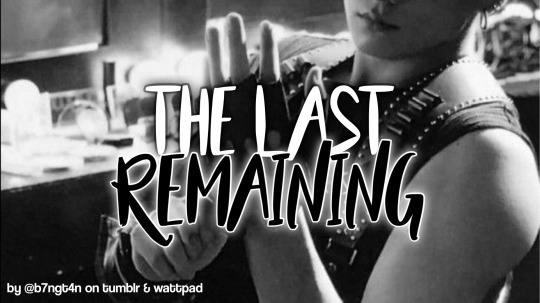
-> South Korea was left abandoned after a 'zombie' virus sweeps the nation. Left to save themselves, Y/N and a group of seven men, who she's found safety in, rely on each other to stay alive as they travel south of the country for a rumoured 'z-free' haven. But nothing is ever easy. Especially when they find it's not only just zombies they need to watch their backs for.
-> A female reader x BTS zombie apocalypse AU
-> Genre: Post-apocalyptic, action
-> Warnings for Part 1: Violence, gore, swearing
-> Word count: 2,071 words
-> Interactions are greatly appreciated xoxo 💖

Part 01: A Month Ago 🧟
A month ago, the nation of South Korea fell to its knees. A deadly virus swept through the country, killing every human it came in contact with and mutating them into flesh-fiending, viciously-violent creatures, fictionally known as zombies.
The outbreak spread fast through Seoul, turning half of the civilians here into zombies within 24 hours. Rumours were that outbreaks happened in Busan, Gwangju, and Daegu before the Seoul outbreak even started. Everything happened within a matter of hours. Nobody had any time to react, you had to fight for your life within the blink of an eye. Even the government was left dumbfounded.
They deployed military power to try and control the outbreaks. However, the number of zombies soon outnumbered the number of military personnel. Eventually, there was no stopping the virus as it just grew out of control.
It was too late for the government to issue martial law. They knew there was no use putting up a fight they knew they couldn't win. Instead they moved onto plan B: evacuation. Your TV was only able to play a singular automated voice message that repeated, 'All of South Korea is currently being affected by the 'Zombie' virus. The government advises you to stay indoors and wait for evacuation processes to be initiated.' And by evacuation, you heard they evacuated the entire Blue House, the closest schools, and the closest retirement villages. You watched choppers fly from Incheon, none of which you saw ever once stopped to evacuate other buildings. That's when you knew the government was absolute bullshit. They didn't bother to try save anyone else. They didn't want to risk it.
You heard the evacuation camp was set up somewhere in Incheon, which made sense because of the helicopters. But you later heard the camp was overridden by the virus only three days later. You never heard choppers flying around ever again. With no government left to guide you, all hope for survival was lost. A week later, the power in your complex stopped running. Matter of fact, you're sure the power for the entire city stopped. Phones stopped working a day after the outbreak so you couldn't call for help. And with food in your apartment running low, you knew your survival rate was plummeting lower by the day.
You were lucky that you only lived on the 5th floor. You had been watching the streets closely the past month. It used to be very busy with screams, growls, tyre screeches, and running footsteps. You even used to be able to hear zombie groans at night. But recently you noticed how quiet it has been. You see a zombie slowly roaming around every now and then but you haven't seen many alive humans. You wonder if everyone else had just left while they could. The more you think about leaving, the more you think 'fuck it, let's do it'. Could it be worse out there? Absolutely. But would you rather die from starvation or die trying to survive?
There was a convenience store just a street down. If you were lucky, you could make it there and hopefully there would be food waiting for you. You just had to be quick. You could do that. You used to be in the track team in high school and a regular gym goer. You can be quick.
"This should be a piece of cake," you encouraged yourself, but the entire time you were screaming at yourself 'what the fuck are you doing?' Only you were hunger-driven enough to go out into a bloody zombie apocalypse to get cup noodles.
You changed into a zip up hoodie and a pair of gym tights, tying your hair into a low ponytail and lacing up in running shoes. You put on your old elbow pads and knee pads from when you were in your rollerblading phase for protection. You also tucked away a pocket knife in your bra. As you were sliding your backpack on, you started having second thoughts. Was this really worth it? Would you really risk dying out there rather than safely at the comfort of your own home? Your life was in your hands but it seemed that any choice you would make could have you dead. You had to at least try. You believed in yourself, you believed you could get there if you tried hard enough. Gripping a baseball bat in one hand and the door knob in the other, you took a deep breath. Carefully unlocking the door, you opened it a small inch, enough for you to peek an eye out into the lobby. It was empty to your relief. You didn't hesitate to make a move, locking your apartment and bidding it a sad farewell.
You jumped to find a zombie lurking around the elevator lobby. It turned around the moment it heard your footsteps, snarling loudly at you. You recognised it to be Mrs Lim, a sweet elderly woman who lived next door to you. You would watch her cats for her whenever she went out of town to visit her daughter. Your heart broke to see her once-white skin drained of colour, her eyes not the usual dark brown but a mustard yellow, and her teeth was covered in dry blood. You didn't have any time to decide what to do about her as she came charging toward you.
"Why does the first zombie I come across have to be you Mrs Lim!" you protested as you held the baseball bat horizontally, keeping a distance between you and her. She was strong for an old lady, well half old lady half zombie, but strong enough to have you sliding back on the tiles. You noticed down the lobby on the other side of the complex were a couple other zombies. They had already noticed you and were rushing towards you.
"Shit!" you cursed, "sorry Mrs Lim," you quickly apologised before kicking her as hard as you could in the stomach. She groaned, stumbling backwards, tripping over her own feet, and falling to the ground. You didn't waste time, opening the door to the stairwell and making sure to lock it behind you.
There were no zombies in the staircase. Though the apartment did feel different without the lights on. You couldn't imagine how much of a struggle it'd be to do this at night without the power working. You had to make sure you were back home at least before the sun set.
A few zombies filled the entrance lobby. You instantly recognised one of them to be another resident who you saw around often and another one of them to be a security guard. You noticed a taser in his holster, something you deemed could be useful to you. They all turned around the moment you opened the door and came rushing towards you. You hit them in the heads with the bat as hard as you could, occasionally using your foot to kick them back whenever they got too close. They all fell to the floor after a good fight from you. You mutter a sorry to them and took the opportunity to steal the security guard's taser and tuck it safely away in your bag, whispering your extra apologies to him.
You hadn't been outside in a month. It felt weird to be back all of a sudden at a place you used to come through everyday. Blood that was smeared on the glass doors made you cringe. You checked the coast. All you could see was the apartment's front garden and the street through the gates. So far, everything was zombie-free. But you don't let your guard down just yet.
Drops of old blood stained the pavement. What was once a nice garden now looks outgrown and somewhat sat on. You could smell the faint stench of dried blood and what you assumed was the smell of dead flesh. The entrance water fountain you thought was so pretty was no longer squirting out water and the water was coloured red. 'Gross' you thought to yourself.
The street was nothing different. Cars were littered all over the place, some had actually looked like they crashed into poles, some were also open. You wondered for a second if you could check the ones that were open out but you also did fear it was only a matter of time before a zombie found you. One car you passed had crashed into a light pole and inside laid a dead rotten woman in the drivers seat. You would have never seen stuff like this before the outbreak. You feel sad for that lady. Who knows how long she had been sitting there? And who knows how much longer she'll be left like that?
Loud snarls made you stop in your tracks. You pressed your back against the concrete wall and peeked slowly around the corner. A quick count of at least 7 zombies were within a 20 metre radius. They blocked the entrance to the convenience store. There were bound to be more too, ones that were hidden in your blind spots. There was no way you could take on all of them.
You noticed a half empty water bottle lying on the floor. Then you had an idea. You snatched it up, crawling behind cars to get closer to the herd without getting spotted. The sounds of their groans terrified you as it grew louder the closer you got. You chucked the water bottle the opposite way as far as you could. It landed on the bumper of a car, sounding its alarm. The loud horn attracted the zombies instantly. They turned around, racing to the source of the sound snarling loudly at it. It was loud enough to probably attract every zombie within a 100 metre radius which would definitely be more zombies than you can handle. But at least you got them distracted. As soon as the coast was clear, you dashed towards the convenience store. Luckily it was unlocked.
The store was a mess. Products littered the ground but the store would was at least half filled. You guess the store could've been looted a couple of times but it's likely this mess was caused the day of the outbreak. You noticed it was also quiet. No snarls, no groans. That was a good sign. You felt a little at ease.
Canned soup, instant noodles, granola bars, biscuits, water bottles. All the foods you have been craving were here in this very room. You have been longing for this moment. You shoved whatever wasn't expired and would likely last a long time into your bag. You noticed your favourite flavour of Doritos 'Sweet Thai Chilli' sitting on the shelf, untouched and not expired yet. You didn't wait to eat these back at home and decided to open one now, your stomach grumbling at the sight. You walked down the aisles like you used to late at night before. It felt wrong to be looting and in a way stealing. You were friends with the owners, a nice old couple ran the store with the occasional help from their daughter. It felt wrong to steal from them. But then again, it was the apocalypse.
Just as you turned down into the end aisle alongside all the freezers of frozen food and cold drinks, a zombie jumped out from the corner, taking you by surprise.
You yelped, flinging the Doritos out your hands by accident. Just in time, you managed to wedge the baseball bat between its teeth, keeping it from biting you. But it was way stronger than you, quickly trapping you between a freezer and itself. You tried to kick your feet at it but it was difficult in the position you were in. The more you tried, the more stronger it pushed against your bat, closing the threatening distance between you both.
You heard the stabbing sound before the zombie stopped moving. A knife had been plunged through the back of its head. The sharp tip stuck out through its forehead, nearly knocking you in the process. You heaved its heavy body off of you to reveal a muscular, middle-aged, man standing behind it. Behind him was a skinnier but taller and younger man. You assumed the two to be friends.
"Thank you" you breathed out, all your energy gone as you lean against the freezer to catch your breath.
The middle-aged man chuckled, an eerie smile that gave you chills appearing on his face, "Anytime sweetheart."
His smile was the last thing you saw before you felt a bash to the head and your world went dark.
(a/n: forgive me ik! "no bts in the first chapter?" "what a shit fucking story!" i know i know 😔😔 i promise it’s development 🙏🙏 appearances begin in the nxt chapter)
#bts#bangtan#bts au#bts fanfiction#bts x reader#bts zombie au#zombie#the last remaining#b7ngt4n#bts rm#bts namjoon#bts jin#bts suga#bts yoongi#bts jhope#bts hoseok#bts jimin#bts v#bts taehyung#bts jungkook
110 notes
·
View notes
Text
Last Sprout Dev Diary - Dec 6, 2024
Hello again folks, I'm back for another dev diary, and it is Upgrade Month for Last Sprout!
If you haven't read one of these, I'm Val, @oneominousvalbatross, and I'm the tech half of the sprout team, and I'm doing these weekly to talk about the process of making a (very ambitious) game, including all the various missteps and learning that I'm doing along the way.
Here's last week's dev diary on Brains
Last Sprout is a roguelite, so that means we need ways to modify your build as a play session continues. So, this week I want to talk a little bit about what we need to prioritize when we're designing our progression.

Get that upgrade juice - you need it to UPGRADE
What an Upgrade Should be
This game is a roguelite, so that means we need ways to modify your build as a play session continues. So, this week I want to talk a little bit about what we need to prioritize when we're designing our progression.
By 'expressive', I mean that I want the choices I make to feel meaningful, and to feel like they are informed by what I want that build to look like by the end of a run. So, an upgrade like "Gain 10% bonus attack speed" is kind of the minimum level of expressiveness. Sure, if I like attacking I can prioritize that a bit more, but when it comes down to it I'd just compare this against other upgrade options and take it if it feels more abstractly valuable.
I don't think there's anything wrong with this, and in fact, I think some number of low-impact choices are helpful for a roguelite to keep a player from tiring out and just picking the easy-to-parse options by the end of a run. But that said, something like "Your melee attacks cause you to lunge towards the nearest enemy within 3m, but you can no longer block." makes your build look and play very differently from others. Plus, when you take big, build-defining upgrades like that, suddenly when you see a small attack speed buff, you think "oh, well since I can't block, attacking faster might be a way to mitigate that downside."
From a design perspective, I find it easier to design expressive upgrades by adding complexity, but that represents a pretty big development cost if you're writing all your upgrades by hand. That leads us to the tension I mentioned earlier - we also want there to be variety in our builds, we want you to have each run feel different enough from each other that you don't end up sticking within a single comfortable playstyle. But, if we want variety, we need quantity of upgrades, but making upgrades can quickly get very time consuming, especially for a team of this size.
To resolve this tension, we had two major ideas. One of them is still in early stages, enough that I think I'll save that for when it's more complete - unless you're in the patron discord, in which case you've already seen some mockups! I'm going to talk about the other option now:
Mods and ModActions
So first of all, I decided to make Upgrades a subclass of a Mod. A Mod is just anything that modifies an entity's capabilities, but it also includes Buffs, which are the temporary versions of upgrades. This is the data that a Mod stores:

BEHOLD
Ok so it's not that interesting. But that's kind of the point! A Mod, by itself, is just a container for a bunch of little pieces, that are all defined separately, the bones, if you will. The Mod itself is responsible for applying all of its actions to an entity, but it doesn't know what those actions are.
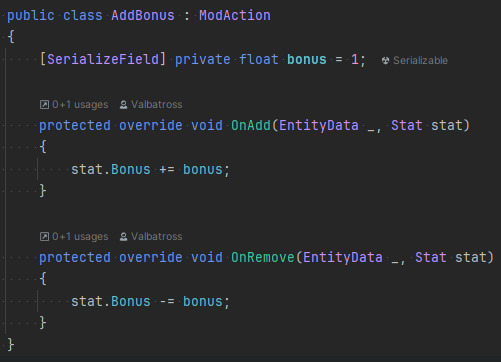
The meat of a mod. Or the brains? I'm losing track of this metaphor.
As a simple example, a mod action can define behavior for when the mod is added, removed, canceled, or activated. Added and removed are simple. Canceled is if the mod is removed in some way that isn't through natural gameplay, like if the entity needs to be refreshed to a base state. Activated is a sort of "whenever X thing happens." It's our container method for mods that will need to do something repeatedly, like when a player takes damage.
We aren't limited to just modifying the entity though! There's already a ModAction for playing an animation, which can be hooked up to any of the base three mod events.
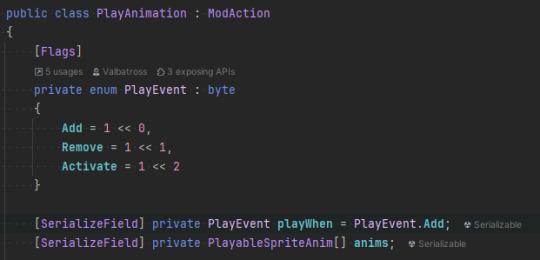
BEHOLD AGAIN
The strength of these actions is that any Mod can contain any combination of these actions, attached to any stats! So the process of building new mods is, much like the rest of the design workflow, like snapping together legos. When we need something completely new, I can go in and write a new ModAction, and then that action becomes available for the rest of development, and in combination with all the other previous ModActions.
I've found that combinatorial approaches create a lot of variety for the amount of design work they require. If you create four mods that are all standalone, that's four different experiences. If you make those out of three individual actions each, suddenly you can mix and match these pieces, and the variety explodes out geometrically, not to mention how mods can interact with each other. Of course, then that can become a bit of a balancing nightmare, but that's a problem for Future Val!
Thanks for reading! If you have any favorite progression systems in roguelites (or roguelikes!) I'd love to hear about them, especially if they do something unusual. December is going to be pretty much entirely dedicated to progressing, both per-run and per-save, so next week I'll be back with something along those lines!
#indie game#dev diary#game dev#Last Sprout#last sprout: a seedling of hope#game development#game dev blog#game dev update#roguelite
21 notes
·
View notes
Text
Around 7 years into the Fourth War, Stormcell and Forcemesh- the two corporations warring over control of the galaxy- realised that foot soldiers were no longer sufficient, no matter how powerful their weapons may be. After all, a weapon is only as strong as its weakest part, and the weakest part in the soldiers of the First Phase was the soldiers themselves- the weapons were capable of wiping buildings out in a single shot, but the flesh behind them could still be broken with a simple bullet or sword to the neck. Trillions of credits were poured into finding a better way to wage war, into a new status quo of suffering, and it was found in the analogue mech.
A marvel of technology, was the analogue mech. Years ahead of its time, its destructive capabilities were unparalleled by even the largest squadrons of infantry. Its weapons were beyond count, its speed could theoretically surpass even a jet plane, its armour was designed by a true genius- but one fatal flaw held it back. Its code was so complex that no computer could run it without delays. Even on an integrated system built into the mech itself, there could still be as much as a quarter of a second of delay between the pilot pushing the button to fire a weapon, and the rain of hell actually being unleashed on the enemy. Regardless of this flaw, it was still pushed to large-scale production, beginning the Second Phase- the dominance of the clunky, delayed analogue mech, and the anti-mech infantry units designed to counter them.
Time passed- new designs for the analogue mech came into the public eye faster than they could count them, with them being replaced with a better design even faster, and eventually, Doctor ___- a now-nameless doctor, graduating from Terra University with highest honours- had an idea. “It’s said that the brain is the most powerful computer ever devised,” they wrote in the paper they published on the possibility of a new type of technology they’d devised. “Its neurons transmit information with higher density, higher precision, than any circuit board born of silicon. It’s a wonder of nature that it was developed with as few faults as it has in modern life forms. So why, I ask, do we still bother with silicon?”
The paper went into detail about the possibility of using lab-grown brains as processors in machines. It was a fairly inconspicuous paper- revolutionary science, to be sure, but nothing immediately useful to Stormcell or Forcemesh. Until, of course, it mentioned the possibility of using animal brains in lieu of lab-grown ones. It was mentioned in passing, just as a future possibility should lab-grown brains prove unviable for whatever reason, but a mention of the possibility was all that was needed to spark research into how it would be done, and a method was discovered within weeks. A fairly gentle pattern of lights (relatively speaking) that when shown to a human would induce a dissociative state. Would make them docile, easy to control.
Easy to rewrite.
The Blank Pattern, as it came to be called, was useless for the purpose Stormcell and Forcemesh wanted it for on its own. It made the viewer more compliant, to be sure, but no matter how much you tell a human to have themself function as a computer, they won’t- it’s impossible. So what has to be done instead is that they’re stripped of their humanity, until their brain wouldn’t dare to not function as it was told.
A followup to the Blank Pattern was soon discovered, which remains nameless due to its existence being a highly classified secret. This pattern is extremely intense, containing light bursts at frequencies of up to 17.3kHz, and the brain can’t handle it, so it simply breaks. The majority of neural pathways crumble, like buildings in the path of a tsunami, leaving a nearly empty brain if allowed to run to its full course. The very basics of the brain are left intact- the weakest of neurotransmitter receptors, basic motor function, some semblance of sentience, but not of sapience. The viewer can’t be called human anymore- it's been reduced to so much more. It now only has the most basic of functions, just enough to survive, to fight for survival, to fight for dopamine.
What did Stormcell and Forcemesh do with this knowledge? What they assumed the other would be doing. The two companies immediately cut 99% of funding to the analogue mech program, redirecting it all to the new program by the name of “Neural”. Pilots, upon signing up, are shown the Blank Pattern, and urged to sign a wavier forfeiting their rights, their possessions, their humanity, and then put in a chamber where the followup is shown. They lose their uniqueness. All that remains of the person a subject once was is a few of the strongest memories, maybe lovers, parents, phobias, but faces are muddied. They may remember they had a dog, but draw a blank upon trying for its name, breed, age. Without purpose, without fine rewards, they crave the bigger rewards that they remain still sensitive to. This is why they make such good pilots- quite literally nothing feels as good to them as the sheer rush of dopamine a reward drive can give them.
After the unnamed pattern is shown, their rights are gone, so surgeons don’t need to keep up the illusion of informed consent when they install the various ports along their spines to link them to the mechs. After all, they aren’t human anymore- why would they need to be consulted? They undergo weeks of surgery until their backs are lined with ports, like craters in a war zone. All for one simple purpose- the connection between brain and machine that triggered the start of the Third Phase- the dominance of the neural.
And what a beautiful connection it was. When the code for the mechs was loaded into the brain, even physical buttons and levers weren’t needed- pilots could perform finer function than any analogue mech with just a thought. Sure, the link could fry some pilots’ minds, and sure, sometimes desynchronisation could corrupt what little remained of the pilot, turning them into a bloodthirsty monster, but just look at the results! Besides, they signed a wavier that warned them- they clearly wanted this.
With the need for pilots growing more and more as pilots died faster and faster, be it by natural causes, dying in the field, or desync corruption, propaganda from both sides grew even faster. Posters spreading sweet lies of what the front lines were lined every street, every wall, every billboard, not one of them telling the full truth. If the public knew what they were doing, they would begin to question them. The war became all society was- in an ironic turn, the fight to defend society devolved into overwriting society.
Well, the public don’t question them anymore, at least.
#creative writing#writeblr#mecha#mechaposting#mechposting#writers on tumblr#i went more into the conversion process in this one#p different to my usual stuff but i still like it#glory to stormcell
27 notes
·
View notes